The Shake Spears – Biography of a 1960s pop group
I had started this project several years ago and I hadn’t worked on it for a long time – but now I am happy to publish this post, finally. It is about one of my favourite bands from the 1960s, one that is sometimes considered “obscure”, and there’s very little information about them on the internet. I wanted to change that, and I was lucky to have one of the original band members among my friends. I first got in touch with Alan Escombe in 2009. We have exchanged many emails and messages, and he has become a close friend of mine. Great parts of the following text are based on our email and Facebook conversations that took place between 2009 and 2014, and the rest is based on several different websites with bits and pieces of information on the Shake Spears and their records. The most important sources were memoire60-70.be, a great website managed by Jean Jième, the Shake Spears’ former manager, and rhodiemusic.com.
I want to thank Jean at this point for all the great work he put into that website, and for the photos in this post that are used by his courtesy.
I want to thank Chris Stone, for providing additional information; but most of all for providing the only (!) photo of The Phantoms that has survived to this day.
And of course, last but not least, I want to thank Alan for sharing all those anecdotes and memories of the past, making it tangible for music enthusiasts who, like me, were born too late to experience this exciting period in music history themselves. Rest in Peace.
The Shake Spears
The story of the Shake Spears is one of the most absorbing within the annals of 1960’s rock and roll. Despite enduring numerous line-up changes involving key members throughout their history, the band persevered, successfully bridging different eras – the mid 60’s British Invasion, psychedelia, and late 60’s hard rock. This is an impressive achievement, as trends in music did not last long in this most volatile decade. The Shake Spears also stand among the very few notable bands of the era to originate from the African continent. Their history began with two young bands in the early sixties in Rhodesia, the Dynamics and the Phantoms. The original line-up of the Dynamics (starting ca. 1963 in Northern Rhodesia, today’s Zambia) was:
Chris Kritzinger – Keyboard, guitar & vocals
Perry Jordaan – Guitar & vocals
Johnny Kreuger – Drums & vocals
Calvin “Cal” Coleman – Bass & vocals
Their local success began to expand to larger cities and they even opened their own club, called “The Dynamic’s Club” (“The Club Dynamique”). The club was frequented by figures from show-business, television and theatre. They encouraged the group to try their luck abroad, so they went to Europe in 1964 and appeared in the Belgian TV show “De Goulden Mirco,” sponsored by the newspaper “Het Laatste News.”
They finally settled in Belgium and were signed to Ronnex Records. The label’s founder and owner, Albert van Hoogten, became their new manager. He changed their name into “the Shake Spears,” which is a play on words with William Shakespeare (to hint at sophistication) and their African origin (mixing savage – supposedly African – spears with the Shake, a popular dance to be found in many songs at the time – “do the Shake”), and was intended to sound exotic to attract the Belgian public’s interest, who at the time were keen on groups from foreign countries.
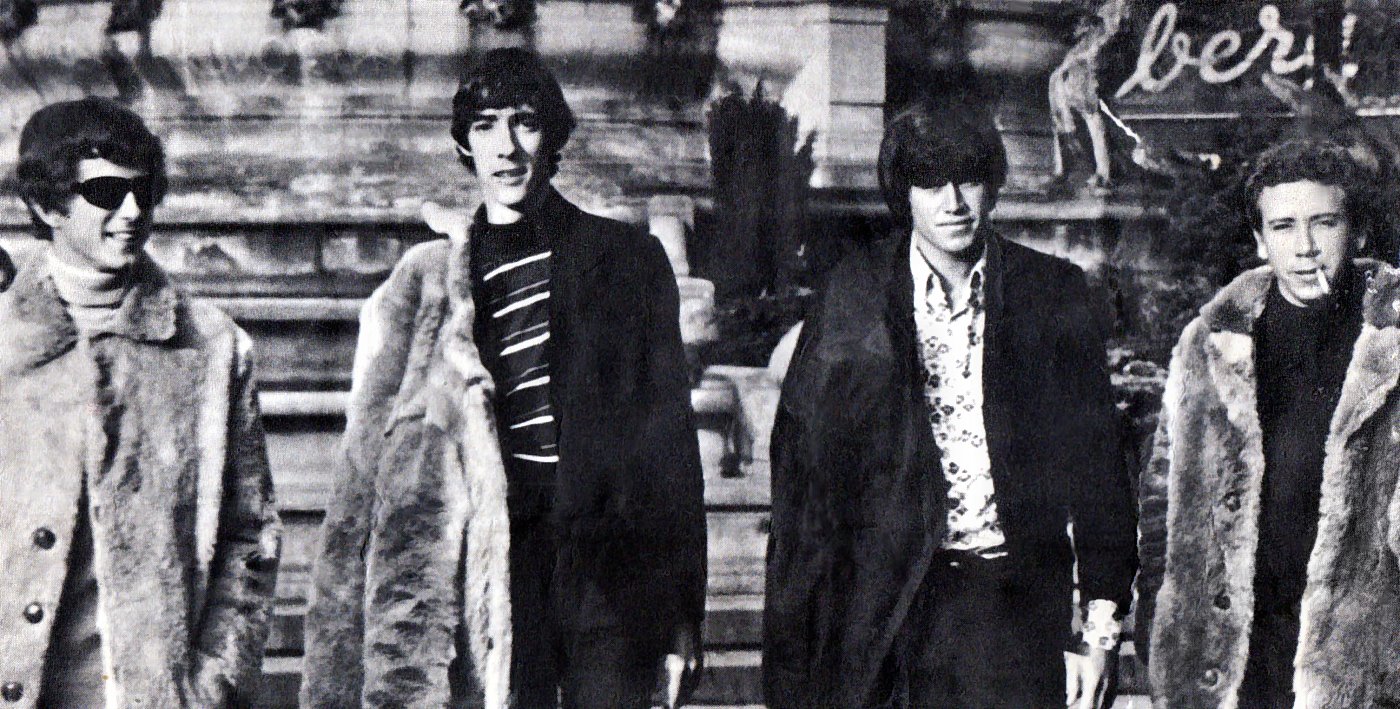
Meanwhile, in the small town Bulawayo in Southern Rhodesia (now Zimbabwe), members of the rock ‘n roll group the Phantoms were making plans for going abroad as well. The Phantoms were founded around 1961 and their members were:
Mike Westcott – Vocals
Chris Stone – Lead guitar
Mike London – Rhythm guitar
Alan Escombe-Wolhuter – Bass
Grahame Ross – Drums
Bassist Alan Escombe remembered the situation at the time, and the conflicts with a conservative parent-generation far away from the beginning revolution of youth-culture:
“I was born in Southern Rhodesia (which became Zimbabwe long after I left). […] All my family – except for me – were heavily involved with the church – Protestants! My older sisters became missionaries and still live in South Africa, but I was the ‘black sheep’ of the family and became aware when I was about thirteen that I had NO belief (atheist). I had already started playing guitar by then but Rock and Roll music […] was considered the devils work in our home. As soon as I left school aged 17, I left home […] and moved to England with the guitarist from our band The Phantoms.”
Playing with the Phantoms had been a great alternative to the dull and religiously bound life teenagers in a small town in Africa had to expect (be good, get a job and settle down), and it certainly provided some comfortable advantages:
“[…] high school dances back then were really something as often it was the first opportunity to get the courage to approach and speak to the girl or boy you had always fancied, if lucky get to dance with them and then of course the last dance was always a slow one (with the mirror ball going) so you finally got to hold each other tight!!! By the time of the high school dances I was already playing in a popular band (The Phantoms) and we played at loads of high school dances so we could watch the young romance happening on the dance floor. Maybe part of the reason us guys started playing in bands was that we never had to try very hard to meet the prettiest girls as teenagers back then (and probably now), always wanted to meet the guys in the band and it was a sort of prestige if a girl was actually going out with a guy in a band. Lucky us!! The girls used to approach us – not the other way around. It also meant we had to be a bit careful as it caused a lot of jealousy for the guys so you never knew who would be waiting to pick on you in the car park after the dances. Once we were professional musicians fortunately we always had really big roadies (they had to be as the equipment could be pretty heavy) so we had our own security in a way.”
To Alan, the times with the group certainly were happy ones, especially because he had the opportunity to attend a concert of his favourite artist of the era, Cliff Richard:
“When we were sixteen (1961), the biggest band that had ever come out to Rhodesia was Cliff Richard and The Shadows. At that time they were really the biggest band anywhere outside America. Most guys (in the world excluding America) who ever started playing guitars had been inspired by The Shadows and in our band (The Phantoms) at that age we were playing everything The Shadows did and had become the top band in Rhodesia as a result of sounding just like them. Anyway, we managed to get front row seats for their show in our town Bulawayo. Anyone would have killed to have been so lucky. […] We had been invited to the after show party because we were ‘famous’ in Bulawayo. (Being famous in Bulawayo is about as impressive as being famous in your own bedroom as it was such a small town”
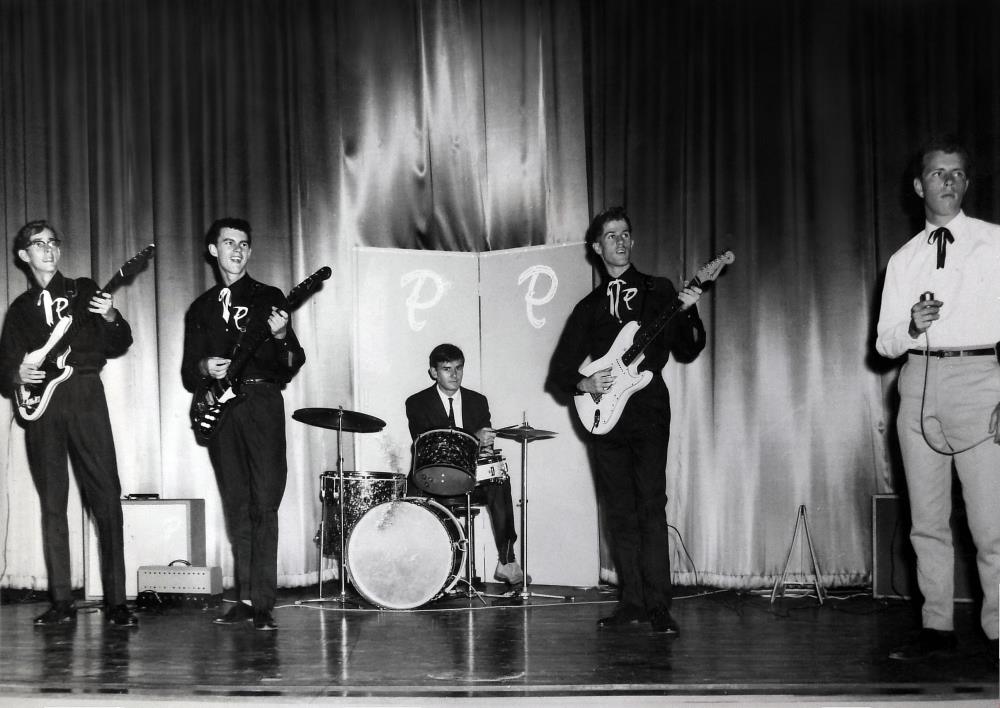
In the end, despite local success and popularity, Bulawayo just wasn’t enough, and Alan decided to leave and follow the Phantom’s guitarist Chris Stone, who had been heading straight for England – a country where guitars just seemed to grow on trees and everyone appeared to have a chance for success in music. The journey to England proved to be long and hard, and as it was the extremely cold winter of 1964/65, African-born Alan was to face some severe (European) climate conditions:
“I certainly remember the good old days with snow. When I originally moved from Africa to England I travelled by one of the big ocean liners that took two weeks from Cape Town to Southampton. Back in the 60’s only the richest folks could afford to fly – even though the flights were pretty awful before jets (most of the aircraft then were what they called turbo-prop on the route from Rhodesia to London). The flight took 26 hours as the planes used to have to stop twice on the way to refuel. (It now takes 9 hours).
Right until the day before we reached England on that sea voyage even though it was the middle of December it was warm and sunny and I thought – well this isn’t bad at all. Then… twelve hours before arrival the ship sailed into the English Channel starting at The Bay of Biscay. It was the roughest sea I could imagine and half the people were sea sick with the rolling and swaying and huge waves. We arrived at Southampton at 6am and as we were coming into the port everyone went up on the deck to watch us come into the docks. I’ll never forget as I opened the door to go on deck I was hit by cold so severe it was like an electric shock. I was wearing every bit of warm clothing I had – three woolen jerseys, a coat and a scarf, but even so within minutes I was frozen to the bone. Of course it was still pitch black as being mid-winter the sun wasn’t due to rise until at least 8am. Then I thought I had made the biggest mistake in my life by moving to England, as a couple of the ‘deck hands’ – (these are the guys who work on the ships to throw the ropes over the side to the dock, clean the decks etc) were on the deck wearing Tee shirts or short sleeved shirts and one of them said to me ‘It’s a bit chilly today isn’t it?’ Here I was freezing to death and he was wearing just a Tee shirt. I figured I would never survive or get used to this kind of cold.
We then took what they used to call the ‘Boat Train’ from Southampton to London. This was a train just to accommodate all the passengers on the ship. One of the passengers by the way was a girl who was really becoming famous in England, and who chatted to me on the boat while we were waiting to get off as she saw I had a guitar case with me – Helen Shapiro. She had been doing a concert in Madeira which was the last stop the ship made before England, of course she was travelling First Class. As the train pulled out of the station at Southampton it began to snow. All of us folks from Africa loved the sight, and all the fields all the way to London were deep in snow. Beautiful!
To cut a long story short, I am glad I joined a band so quickly to occupy my mind as it turned out that the winter that year was the worst one England had had for over twenty years. Snow, Ice, Fog […].
Anyway after the shock of that first winter things were much better and I really enjoyed the snow and cold winters from then on.”
While Alan was beginning to acclimatize in the new country, the rechristened Shake Spears began to have success in Belgium.
Van Hoogten had ensured them a work permit for at least a year, regular live performances, and to record and release three to four singles. Their very first 45, “Shake It Over” / “Cry For Your Loving” (Ronnex 1336), climbed to rank 17 in the Belgian Hit Parade of February 1965 and made it to rank 93 in the overall Belgian charts of the year 1965. Other singles recorded at the time were “Do That Again” / “Don’t Play Funny Games” (Ronnex 1347), and “Garden of Eden” / “Nossi Dan” (Ronnex 1352).
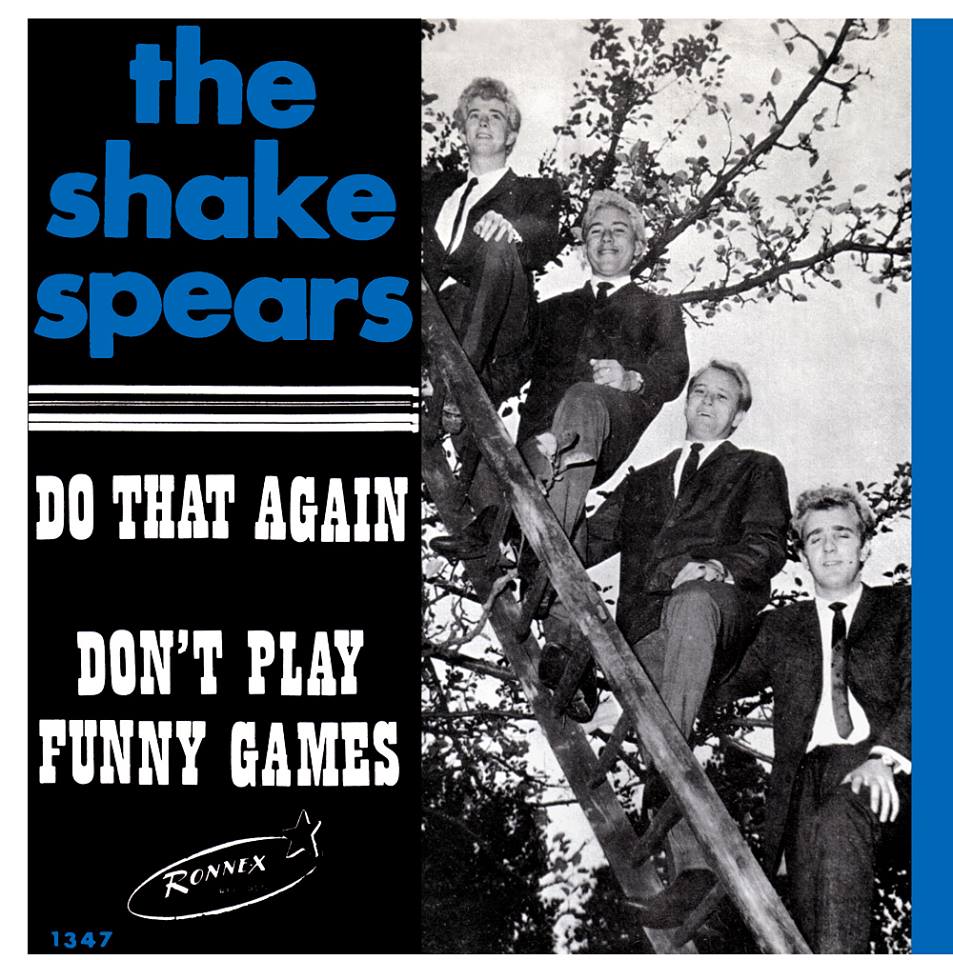
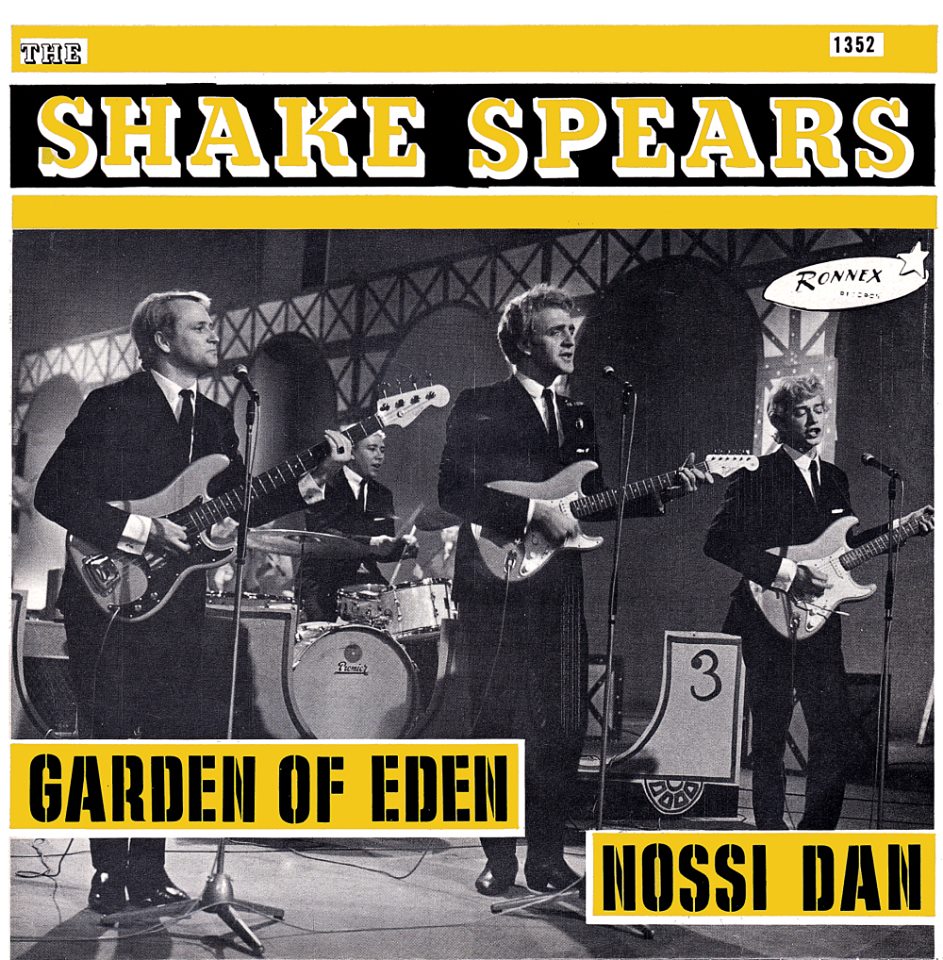
Their fame spread outside Belgium and also reached England, where editor and composer Bill Crompton became interested in the group. He offered for them to come to London and record singles on the prestigious EMI label – an offer hard to reject for van Hoogten, although this meant the group had to work on Crompton’s own compositions. He eventually agreed and the Shake Spears relocated to England in February 1965, planning to stay for six months.
On the other side of the Channel, a young man was almost shivering to death and waiting desperately to get a chance to join a band again:
“When I arrived in England in the 1960’s in that dreadful cold almost no central heating existed anywhere except in Public buildings and Hotels. All houses were freezing and there was always a horrible smell of gas in the air as just the sitting room in houses would have a small gas fire. In the small flat (it was actually just a large room known as a bed sitter […]), so at one end there were two beds, then there were two armchairs facing a small gas fire and in the corner a one plate gas cooker. The bathroom was up the stairs and was shared by all the other bedsitters in the very large three storey house. There was a coin meter for the gas fire and one shilling (I suppose equivalent nowadays to one pound sterling based on how money has inflated since then), would last for about ten minutes. As the guy I was sharing with and myself had very little money when we arrived in England all we could do when we got back to the room was put the gas fire on for ten minutes to warm our hands from the cold outside and then get straight into bed to keep warm. It was dreadful.”
His chance would be coming soon, as the Shake Spears’ bassist Calvin Coleman suddenly had to leave and a replacement was urgently needed. Not hesitating for a minute, Alan Escombe joined the Shake Spears to become their new bassist. As a huge fan of Cliff Richard and the Shadows, Alan was happy to find a band that was able to achieve the sound of his idols:
“They [The Shadows] were probably the biggest influence on hundreds of guys who formed bands in the late 1950’s early 1960’s with their unique perfect playing, guitar sound and instrumental compositions. The stuff was easy to learn and play very quickly (Jet Harris the original leader and Bass player was definitely my biggest teacher and influence on Bass guitar). All bands tried to sound as smooth as the Shadows but very few succeeded. Early Shake Spears did manage to achieve this […]. While we were in Australia we used to do a live Radio show every Friday morning and the theme music that we always played at the start of the show was a Shadows tune ‘Dance on’ – which coincidentally is the tune that Brian Matthews uses on the BBC Program Sounds of the Sixties.”
The line-up complete again, the group were taken to the Regent Sound Studios to record two songs for Crompton. But it seemed the line-up wasn’t “complete enough,” as not just one but two vocalists were added to the group: the English singers Gene Latter and Linda Millington, who were hired for a special idea that Crompton had, resulting in the following record: “This Is The End” / “It Hurts Me” (Parlophone R 5268, 1965 April 16) more info on 45cat.
“I think the Teeny and Tony record on Parlophone label (‘A’ side is This is the end and ‘B’ side It Hurts me) is probably the rarest record in the world. Probably only about 1000 were released before the huge dispute about publishing rights started and EMI/Parlophone withdrew the record from the shops. The songs were written by a guy called Bill Crompton together with Chris Kritzinger from The Shake Spears. Because The Shake Spears were still under contract to Ronnex Records in Belgium the […] name Teeny Toni etc. was used by Bill Crompton to try and hide the release from our Belgian manager. As Chris Kritzinger was also under publishing contract to Ronnex Records, the name shown as a writer on the record was Chris Cavery (I don’t know where he got this secret name from). Of course our manager in Belgium found out about the release very quickly and sued Parlophone Records for half the publishing rights and royalties for the sales. All very nasty, but that is the sort of thing that was going on with bands and contracts in the 1960’s. Bill Crompton […] was trying to manage and promote a girl singer Linda Millington as she was very much like Lulu, so on the ‘A’ side Toni was Gene Latter, and on the ‘B’ side Teeny was actually Linda, and The Shake Spears were the Bushbabies. They thought it would be a unique idea to have a guy singing on one side and a girl on the other. The record was actually pretty good and in the first week of release received very good reviews and publicity, so it is not surprising that the Belgian manager found out about it very quickly as he used to read all the English music papers.[…]
It would even be a surprise for me to hear that record again as I haven’t heard it since 1965. The reason I think it may be at the BBC is because they actually played it several times when it was released, and at one of the Ideal Homes Exhibitions in London 1965 they had a BBC section where several artists lip synced ([…] it is when they mime to their record not singing live). Our record was played at their stand with Gene Latter lip syncing to it. The BBC has huge archives – I don’t think they ever throw anything away, so a good chance that this is there. It was on the Parlophone label.”
To this day, only very few copies of this record have surfaced, perhaps more of them hiding deep in the dust of the cellars and attics of British babyboomers who forgot about about the 45 they collected as teenagers. In 2013 two acetates were sold according to popsike.
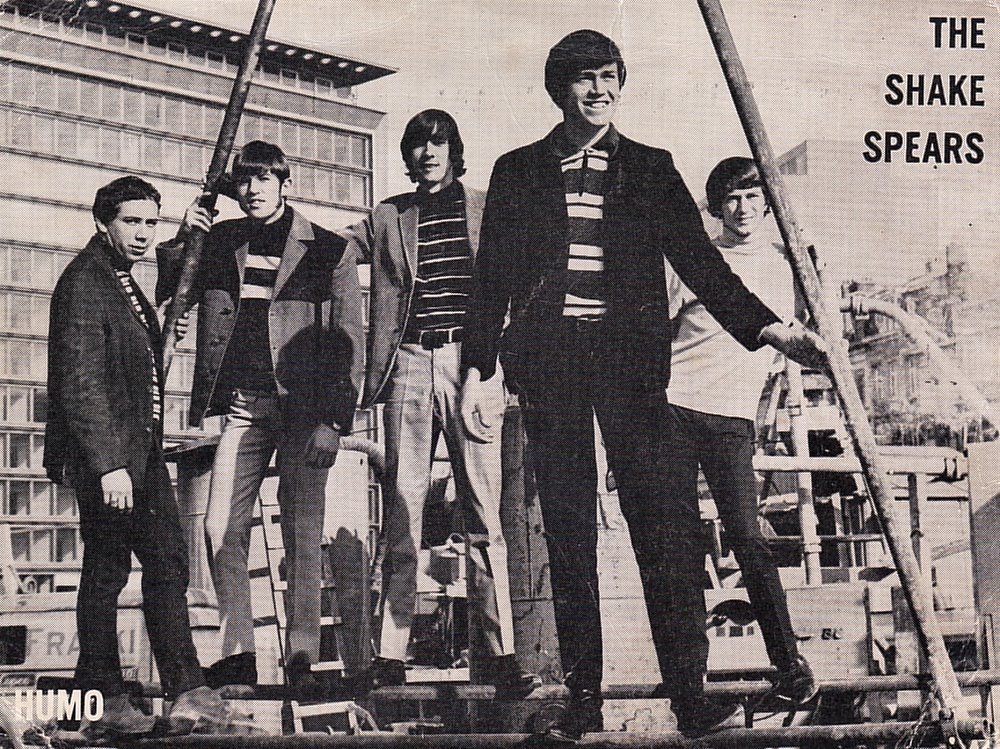
Linda Millington, however, stayed with the group until June 1965, and Gene Latter became their steady vocalist until February 1966 (some compilation releases that appeared after the group disbanded appeared under the name of “Gene Latter and the Shake Spears”, which may lead one to the conclusion that Latter was their leader, but this was not quite the case). The group enjoyed engagements in several London clubs and thus a growing popularity and increasing number of fans. “A very successful time,” according to Alan, and he sure was right.
At just this moment, Roy Orbison was just finishing a world tour, and the saxophonist of the band supporting him, an Australian named Ron Patton, was looking for a new job. The Shake Spears were invited to attend some of Roy’s shows to check out Ron’s sax playing – and they were impressed. Ron became the sixth member of the Shake Spears, his instrument providing the sound they would need later for the biggest hit of their entire career.
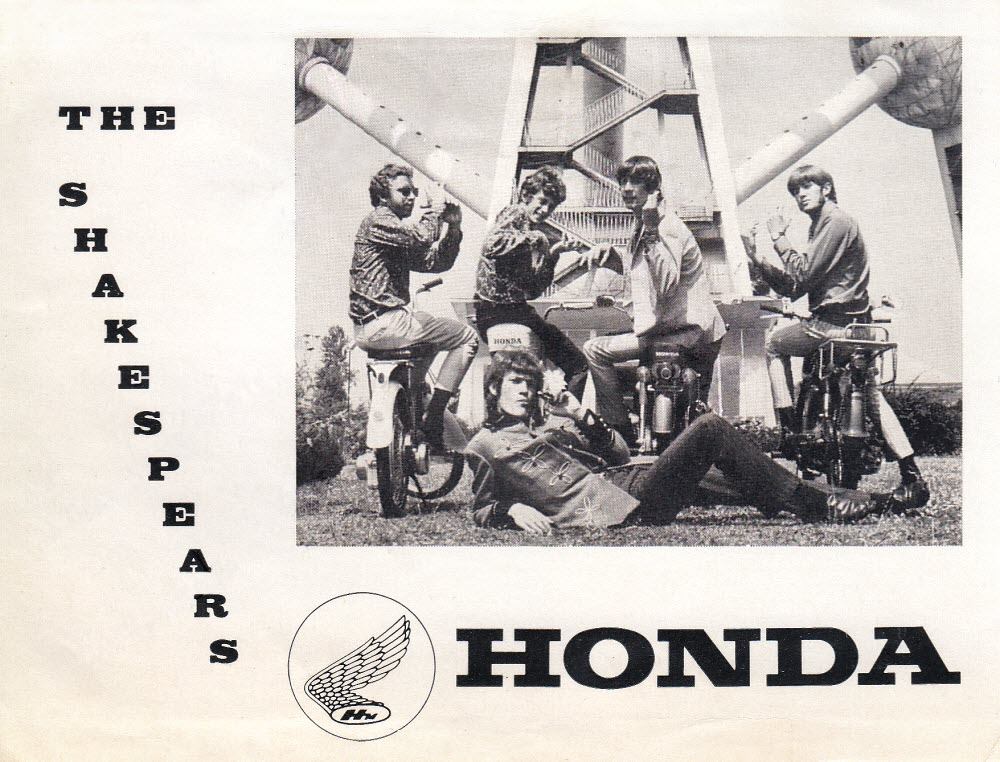
Soon the group began to understand the true stipulations of the contract with Crompton they had accepted: they were only allowed to record songs written by Crompton himself. The songs written by the group’s songwriter Chris Kritzinger would remain unreleased, and the group’s ambitions and creativity would be curtailed. The contract in general was strongly designed in Crompton’s favour, also concerning publishing rights. At the same time, Linda Millington became less and less reliable. The group grew fed up with the situation and decided to go back to Belgium and back to van Hoogten – leaving Linda and taking Gene with them.
In June 1965, the Shake Spears returned to Brussels and recorded a brand new 45 in the Decca Studios: “(Do) the Shake Spear” / “Give It to Me” (Ronnex 1360), the A-side (a driving freakbeat number that appears on many 60s compilations today) was written by Chris Kritzinger, the B-side by Gene Latter. Van Hoogten at first wasn’t very happy about the addition of two new band members without his consent whom he now had to pay, and didn’t expect much from the new recordings. However, upon first listening to the songs, he was impressed. In addition, the groups live performances gained a lot of attention because of Gene Latter’s showmanship as a wild singer and dancer, loved by the Belgian public.
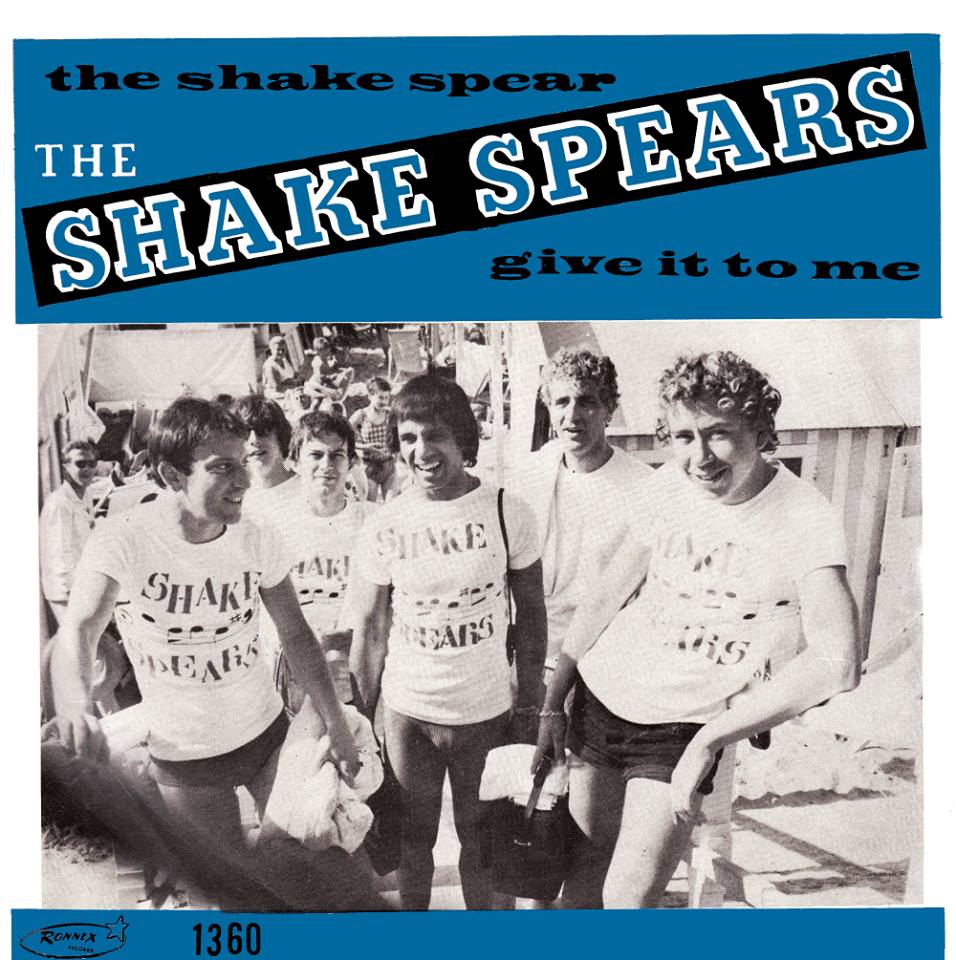
On the 11 and 12th September 1965, the fourth issue of the “De Gouden Micro” (the TV show they had already appeared on as the Dynamics when first arriving in Belgium) was broadcasted from the Sport Paleis Antwerp. The Shake Spears played on the show just before the Animals, and before the show shared a couple of drinks with Eric Burdon and Chas Chandler. A regular part of the Shake Spears’ live set at the time was an instrumental rendition of the theme song of a popular British TV series featuring Roger Moore – “The Saint.” That night the track was recorded. Surprised at the great quality of the recording, the group decided to release it as a 45. Making up the counterpart of “the Saint” on the A-side, the B-side was an instrumental called “Lucifer.” Alan recalled (in an email to the Shake Spears’ former manager Jean Jième):
“The year they won the Gouden Micro we were the afternoon ‘star’ attraction, and the Animals were the evening ‘star’ attraction. […] Gene Latter and Ron Patton were in the band then, and we also had two girl dancers so that when we played Do The Shake Spear, they could dance with Gene. It was on that show that Belgian radio recorded The Saint live which we released as a single. (A minor mistake – The Animals had already recorded and released We gotta get outta this place before the show at the Gouden Micro – it was already a hit in Belgium. Before the show Gene Latter, Ron and myself spent the early afternoon getting pretty drunk with Chas Chandler and Eric Burdon at a hotel in Antwerp. Albert van Hoogten was not at all happy as he thought we wouldn’t be able to play!”
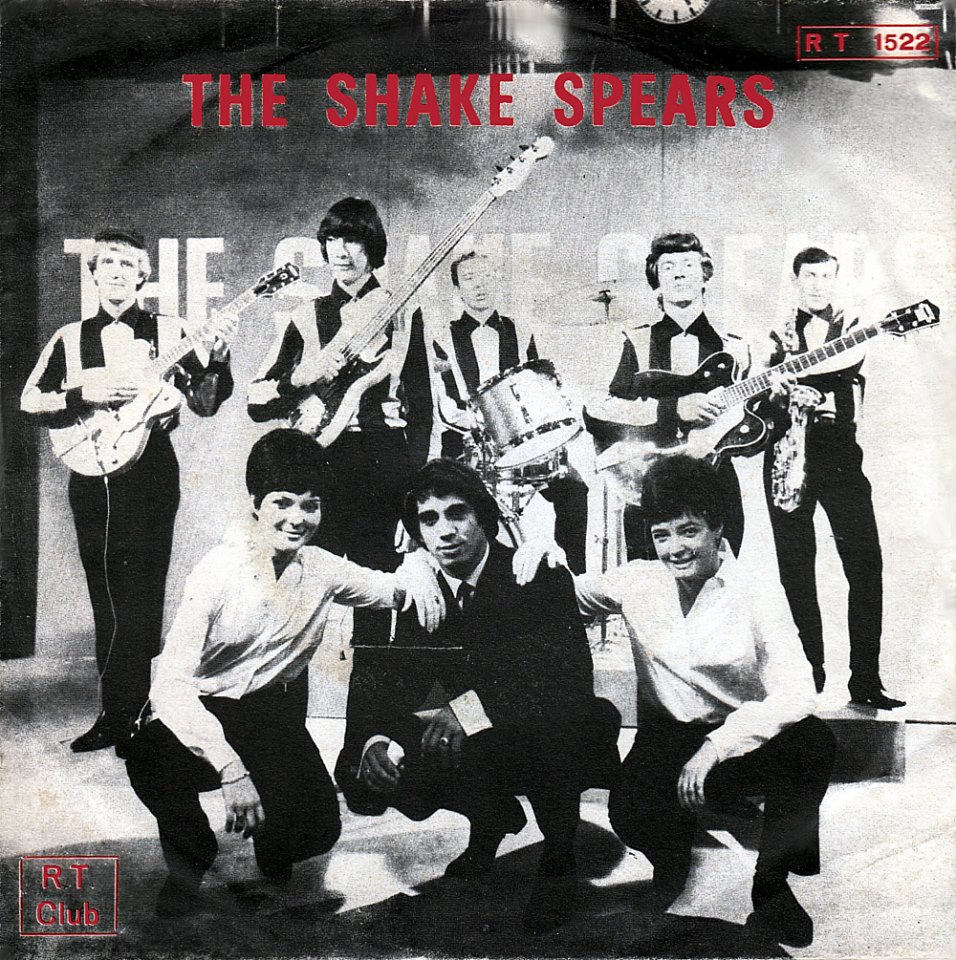
“The Saint” / “Lucifer” (Ronnex 1366) was released in October 1965 and became a hit, reaching #30 of the Belgian Hit Parade in January 1966. The next big success wasn’t far away, the Shake Spears’ famous ska-version of George Gershwin’s “Summertime” was recorded the same month – to this day it is their best remembered song and can be found on a lot of 1960’s of compilation records. It was first released on “Summertime” / “What Happened” (Philips 319763) and re-released several times until the late 1970’s.
“We never made a studio version of The Saint as we never really expected to release it as a single, so we just used to do it live. We were surprised by the quality of the live performance and atmosphere at the show in the Sports Paleis in Antwerp, so it was released (a big surprise to us when it was a pretty major hit but that happened to us a few times. Summertime was something our manager wanted us to record so just as a joke in the studio we did it as a SKA/reggae version, and were amazed when it went to number one in the charts and turned out to be one of our best selling singles before Burning my Fingers). You may be surprised to know that although I have a deep voice all the highest harmonies on all the songs are sung by me!!”
“Summertime” went to #96 in the Belgian charts of 1966, and in that year a promotional LP titled “Give It to Me” (Philips QL 625 276) appeared in the Netherlands, which is today extremely rare and highy sought-after. It received a four-“records” rarity rating (six being the highest possible rating) in Hans Pokora’s 2007 book “5001 Record Collector Dreams.”
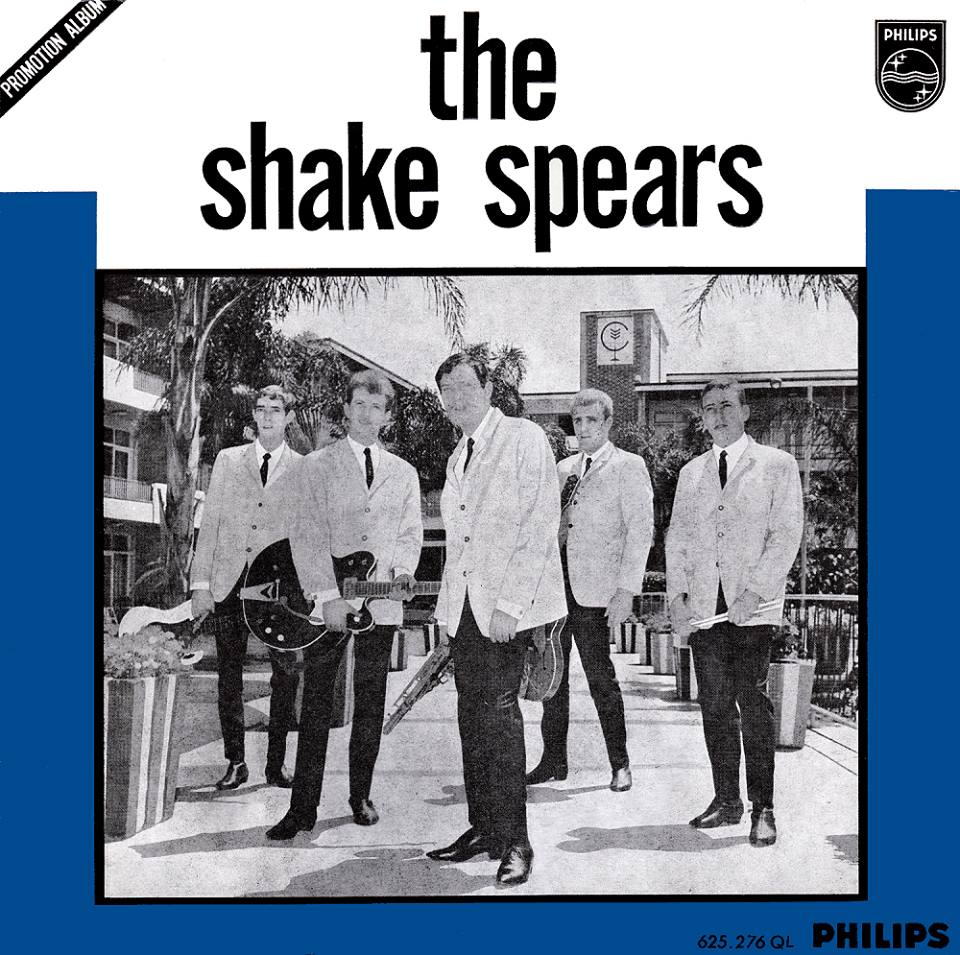
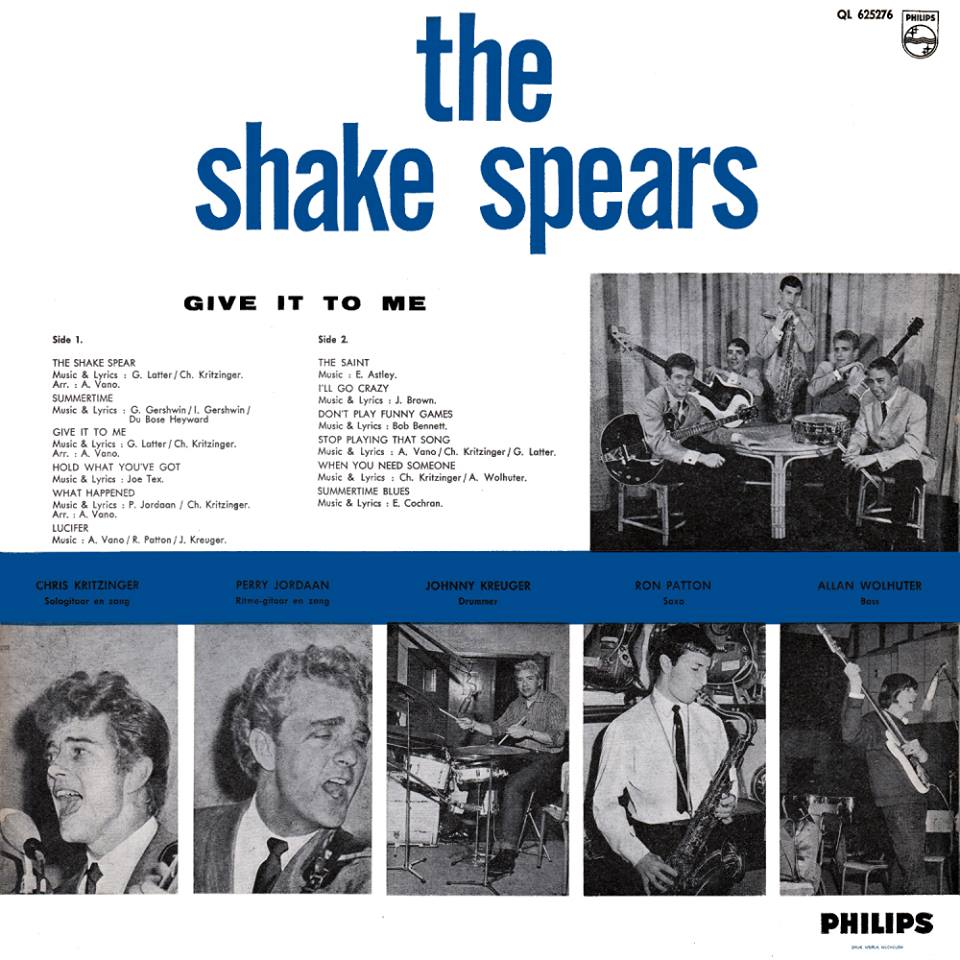
“On the Philips album ‘When you need someone’ you will see was written by Chris Kritzinger and me. ‘Hold what you’ve got’ is a Joe Tex song, but Gene had a great falsetto so he wanted to record it. We did it far better live as it is a difficult thing to do in the studio – especially the talking bit.”
After two hit singles in a row, the group were facing internal problems. Gene Latter’s temper had always been a problem for the group in varying degrees, but by February 1966 the situation was escalating. Apart from this, he still had his wife waiting for him in England, and her visits in Belgium mostly caused complications. In addition, the band had to face the difficulties of wearing long hair at the time:
“When we arrived in Belgium in 1965 no men had long hair so of course they would always comment on our hair and we would always hear the word ‘coiffure’ (barber) somewhere in their conversation. Gene also was one of the first guys they ever saw who had an earring. This was a real problem especially in a foreign country where he didn’t speak the language and he always imagined that when anything was said to him in Flemish or French that guys were making fun of him and the next thing we knew he would be fighting. […] A real shame as he was a great front man in the band as a singer and could really get an audience excited within a few minutes, but living with him became impossible. He had been told by our manager that if ever he threatened anyone in the band he would be thrown out (same as Roger Daltrey in The Who), but eventually the rest of us couldn’t take his bad behaviour anymore as it was bad for our reputation when he would even start fights in restaurants and at events where we were invited as special guests. After six months in Belgium he was thrown out of the band just before we were given the contract which took us to Australia for nine months in 1966.”
Gene Latter moved back to London, into an apartment with very noisy neighbours – a young group practising in their garage. Gene first was annoyed by this, but then realized that the guys had a lot of talent and helped them to release their first single, using all his contacts to the music business. The group was to remain a one-hit-wonder, but a quite famous one – the Equals with “Baby Come Back”.
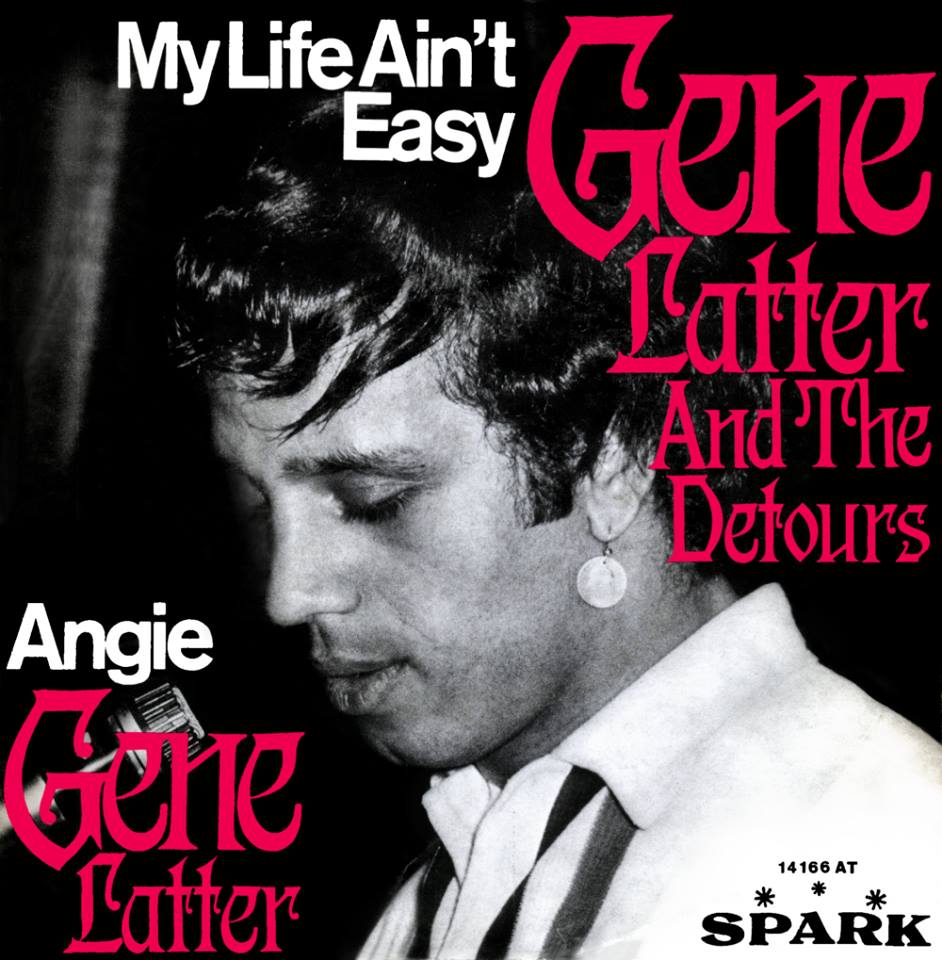
This was Gene’s last major brush with fame, he then began a solo career and released several 45s. His records appeared on several labels, mainly Ronnex, but also CBS, Spark, Polydor, Decca and Bellaphon. A complete discography is not available (yet), and every now and then records and alternate releases seem to surface. Latter never had a lot of commercial success with his own records, and his style in music took a 180 degree turn to what the Shake Spears were then approaching (psychedelic pop/rock and later progressive rock), turning first to easy-listening pop with a lot of cover material (for instance the Rolling Stones’ “Mother’s Little Helper”), then to the popular disco-funk of the 1970s – one of his most famous releases being “Rock Your Boat” / “Funk and Hustle” (Ronnex 1452) from 1978, which surprisingly was released under the name “Gene Latter and the Shake Spears,” despite the fact that the Shake Spears had nothing to do with the record at all, and did not play on it. Although the Shake Spears did not exist as a group anymore at this time, seeing their name used by Latter didn’t please them a lot, Alan said:
“I have heard some of the stuff that Gene Latter did using the name The Shake Spears, and to be honest I don’t like any of it. He only kept using the name so that he could get record sales in Belgium and Holland, but it was a surprise to me when I first started checking out collectors websites to try and find our recordings to see discs released by Gene under our name. Cheeky!”
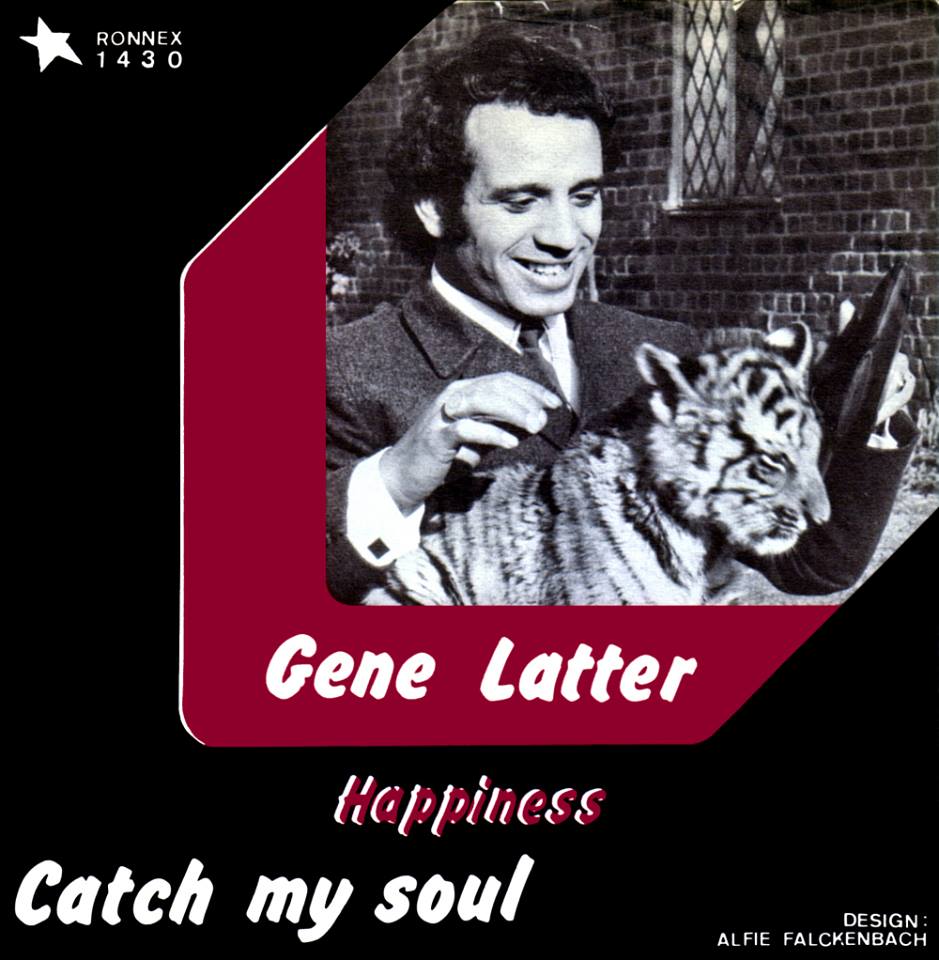
A story showing interesting similarities to that of Rod Evans of Deep Purple, Latter’s biography remains vague (Evans disappeared after being sued for officially using the name of the band he had been thrown out of – not seen for over thirty years, today it is unknown if he is still alive.) He was born as Arthur Ford in Cardiff, Wales, into a family of Arabic background. He lived at South William Street, Butetown (Tiger Bay) and had been a member of a local band called “the Alley Cats.” In the mid-sixties Latter went to London, where the Crompton / Shake Spears episode started, and later that with the Equals, on his return. There were connections to a band called “the Cousins” (not the Belgian surf / instrumental group), and in 1967 he fronted a group named “the Detours.” Latter released several 45s until the early eighties, where his trace suddenly disappears. Nothing was ever heard of him again.
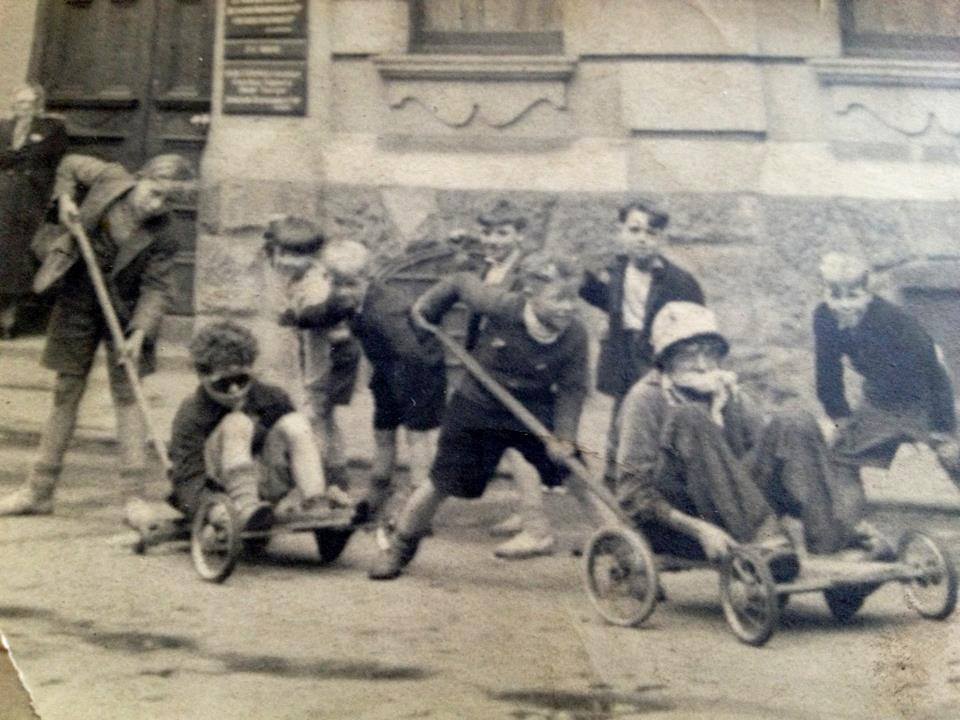
Having lost their singer and stage-frontman, the Shake Spears got lucky again when they were offered a well-paid trip to Australia. Having learned from the trip to England and the trouble with Crompton, van Hoogten only accepted this offer under two strict conditions: the stay should not exceed three months and no records should be produced for a record label other than Ronnex, so that he could keep the exclusive publishing rights.
They started playing in a club called “Skyline Lounge” – a huge establishment that held up to fifteen-hundred people. It soon was packed every night and the group were overwhelmed by the initial success. The group were asked to stay for more than three months, and – against the initial limitation – they did so, obtaining higher payments, four girl dancers, and a new singer, Doc Jones, who took over the vocal duties in June 1966.
After staying in Australia for nine months, the Shake Spears, now known nationwide, were going to return to Belgium. They didn’t take their Australian singer with them, and they had also lost their Australian saxophone player. Ron Patton had felt so at home in his native country that he decided to leave the group and stay in Down Under. The driving, wailing sound of his sax would be missing from now own, but songs like “(Do) the Shake Spear” and “Summertime” ensured that his playing would not be forgotten any time soon.
Shortly before leaving, the band spent a final night at a small club called the “Surfers’ Paradise” where Alan by chance discovered a new voice: the sweet voice of young Queensland-native Brian Bastow (British-born though; Brian and his family emigrated from Salisbury, Wiltshire, to Australia when he was four years old), who was singing in the club that night. Brian was immediately approached by the group and asked to come with them to Belgium. Time was short as they had planned to depart the very next day, but Brian agreed and so Alan and Johnny quickly bought him a plane ticket – and so the Shake Spears came back in the same number as they had left (five members).
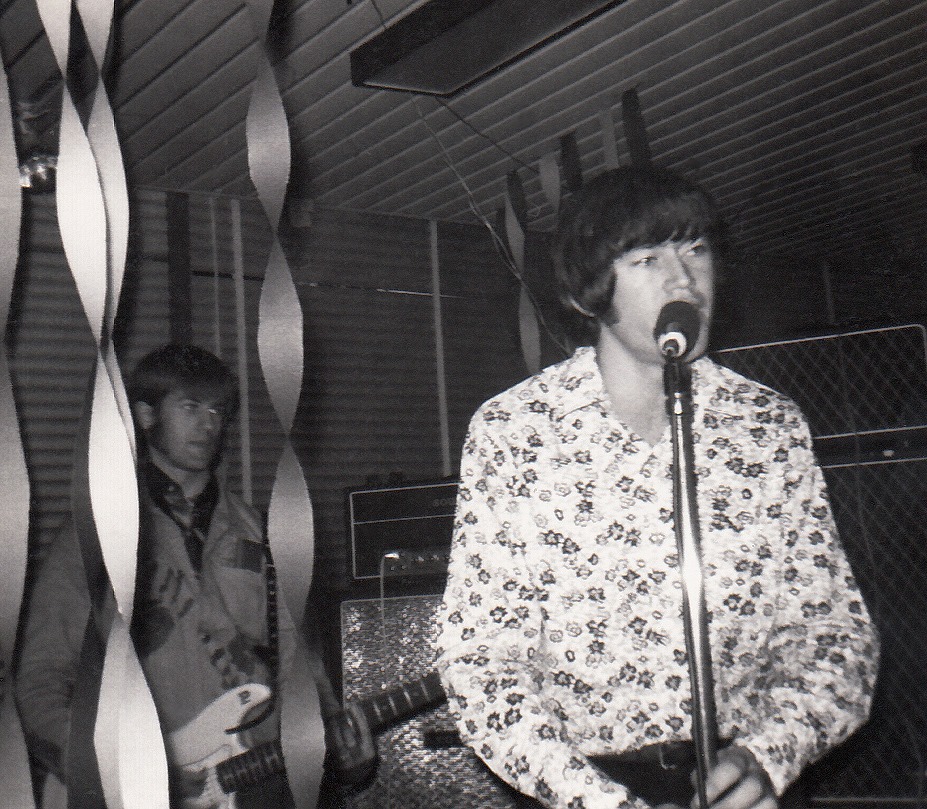
Although van Hoogten had no reason to be upset about additional payments this time, he immediately sent the group to Studio Madeleine to record new material. He was pressed for time for a new release. The result was “Candle” / “Jerk” (Ronnex 1372, 1966), the only official Shake Spears release with Brian on vocals. The B-side, “Jerk,” was in fact a cover of Sam Cooke’s “Shake” (already covered by many artists, including the Small Faces, the Animals and others). The management had decided to change the title into the name of a “hip” dance to make the track more interesting, against the band’s wish to keep the original title. The record flopped when another cover of “Shake” (now with the original title) was released in Belgium by Otis Redding, who also sang it at the Monterey Pop Festival.
It soon became apparent that the group’s choice for a lead singer was made in great haste. Brian had been singing cover versions of songs by Roy Orbison, P. J. Proby, the Hollies, and others when they had discovered him, and during their rehearsals and recording sessions in Brussels he proved to be quite adept at reproducing the vocals of cover songs while even adding his own style of singing to them, but had obvious difficulties with singing original material. As the Shake Spears were no longer considering themselves a cover band and had no intention of going back to being one, Brian just was not the singer they needed.
But this was their very own attitude – in fact, in order to stay successful and face the growing competition of other “foreign” groups in Belgium, they did not only have to play long hours providing dance music in clubs and halls, but also integrate more and more cover material into their set. This was driving them away from the direction they had originally wanted to pursue: landing hits with their self-penned material and being renowned for their own style. Now they were becoming more and more of a dance band – faceless, anonymous, to be called on demand and used as a jukebox. The first Shake Spear to become unhappy with the situation was guitarist Perry Jordaan. In February 1967 he left the group and went back to Africa, where he rejoined his family, whom he had not seen for more than two years.
The Shake Spears were now lacking a guitarist, essential for virtually every 60’s rock / pop group. Help came from Africa once again: Alan’s former bandmate from Phantoms days, Chris Stone, had often watched the Shake Spears’ performances in clubs while they had played in England. The Phantoms’ former guitarist had no current commitment by that time (lucky for the Shake Spears), and so he arrived in Brussels in March 1967. He was quickly integrated into the group. An adept musician, it didn’t take long for him to be well-versed in the entire Shake Spears repertoire. The group continued playing without any loss to their sound, and was able to fulfil every engagement.
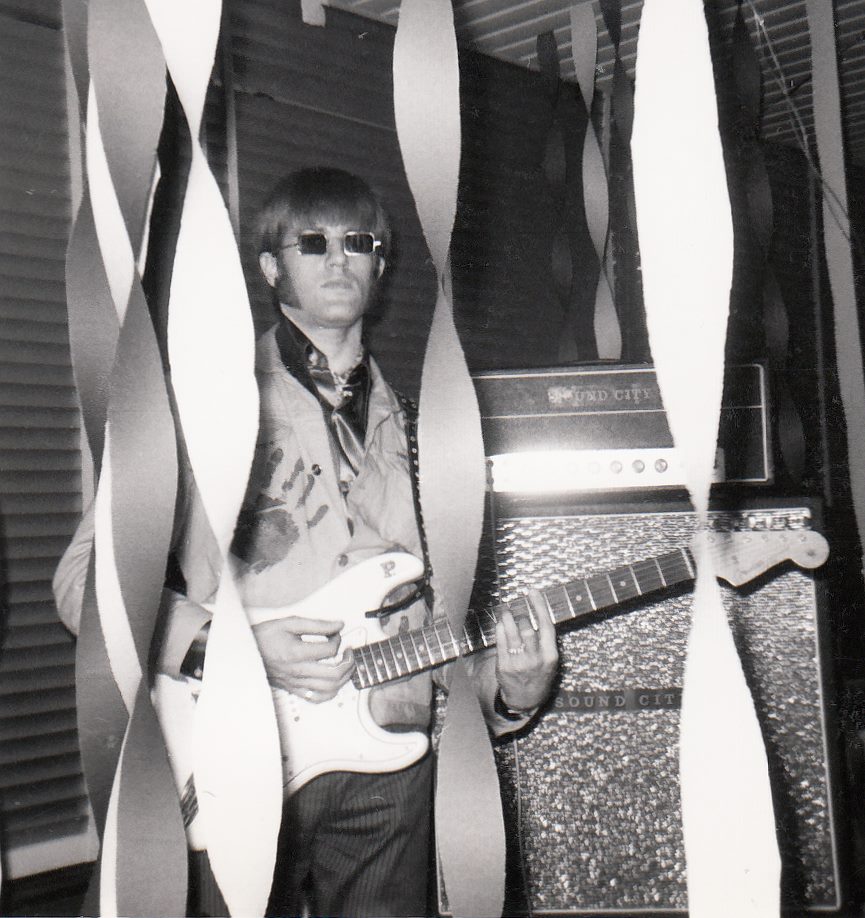
Furthermore, Chris Stone was also active as a songwriter in the group. Their songs were now written by him and Chris Kritzinger, with occasional contributions by Alan Escombe and the other members.
As the Shake Spears now had two members named Chris, Chris Stone was nicknamed “Sox” to avoid confusion between the two.
Having successfully solved the guitarist-problem, the group were worried about their singer again. Brian was good at pop songs – a handsome crooner with a sweet voice, but could not really follow the group’s approach to a more rock orientated style. They eventually decided that he had to leave the group. To Brian, this was anything but a disaster, as van Hoogten immediately signed him as a solo artist, providing the soft, British pop songs the Belgian audience seemed so receptive for. This was not a bad idea at first, especially as Brian’s first release unexpectedly became an immediate hit. This was his last work with the Shake Spears:
“After Brian left the band our ex manager took him on as a solo artist. […] he asked us (Shake Spears) to play on Brian’s first recordings which we did for straight payment, but we didn’t want our name associated with the records as they were definitely not our taste in music so we called ourselves The High Five. Brian was quite a good looking guy and the manager promoted him as a sort of Englebert Humperdinck singer – wearing suits and high collar shirts or Tuxedo. Brian also recorded a couple of the songs we had written but thought were rubbish – Da Doo Dum Dum – I’m Gonna Love You – The Girl with the Bass Guitar. His biggest hit was a cover version of a very old song from the 1930’s, Poinciana, which we played on.
The thing that we always found odd about the Belgian public was the fact that when they clapped along to a song they always clapped ON the beat – not as one would normally clap to a rock song on the OFF beat, so for a complete joke we recorded Poinciana with the emphasis on the ON beat. It proved a point as the Belgians loved it and it was a hit. Apart from the songs we wrote for him and Poinciana, all the other songs he recorded were cover versions as the manager did a deal with a record label in Ireland (Major Minor Records). They would provide Ronnex records with Irish hit songs and just remove the voice so that Brian could sing over the musical backing. This was ok on records, but the band he formed couldn’t really play the stuff live so his career didn’t last very long.
[…] The last I heard was that he was back in Australia working as a postman in Sydney.
[…] Remember when listening to Poinciana what I said about the ON beat, also the little bass line which starts the song THAT IS ME!! […] the original paper sleeve [of Poinciana] was a picture of Brian with the other guys on the cover with their backs to the camera. That was us.”
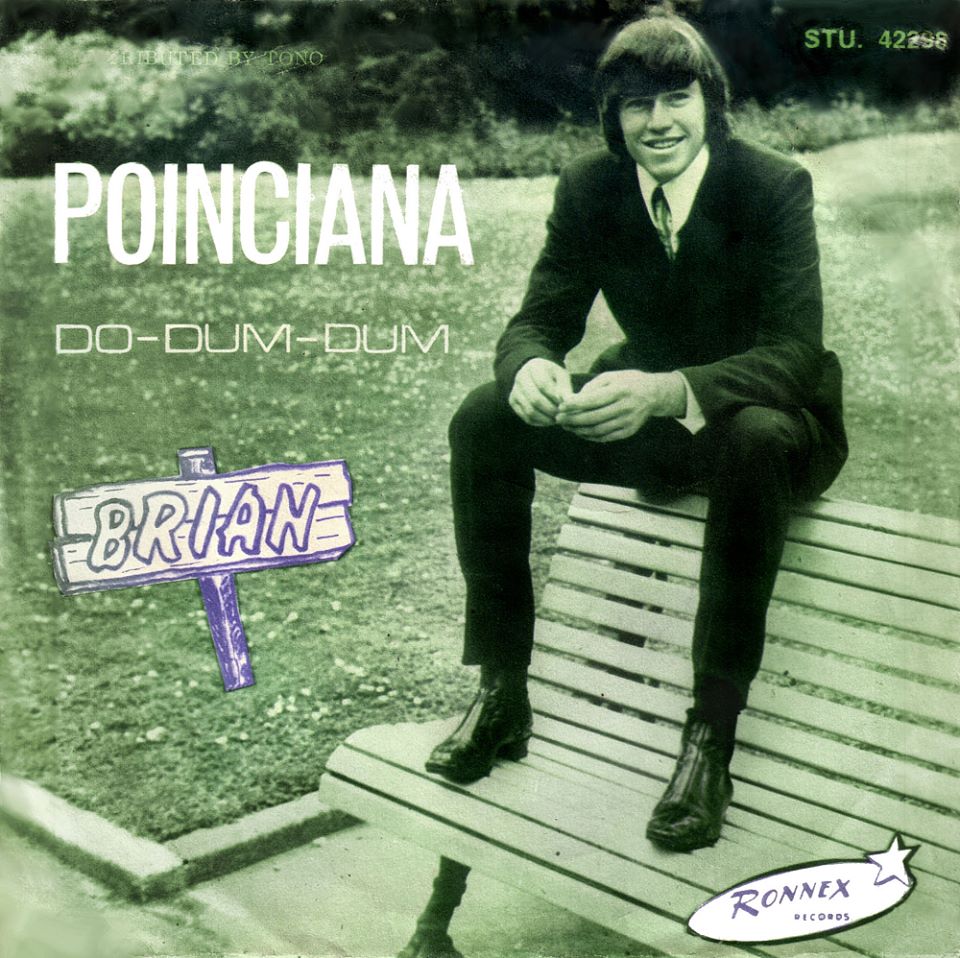
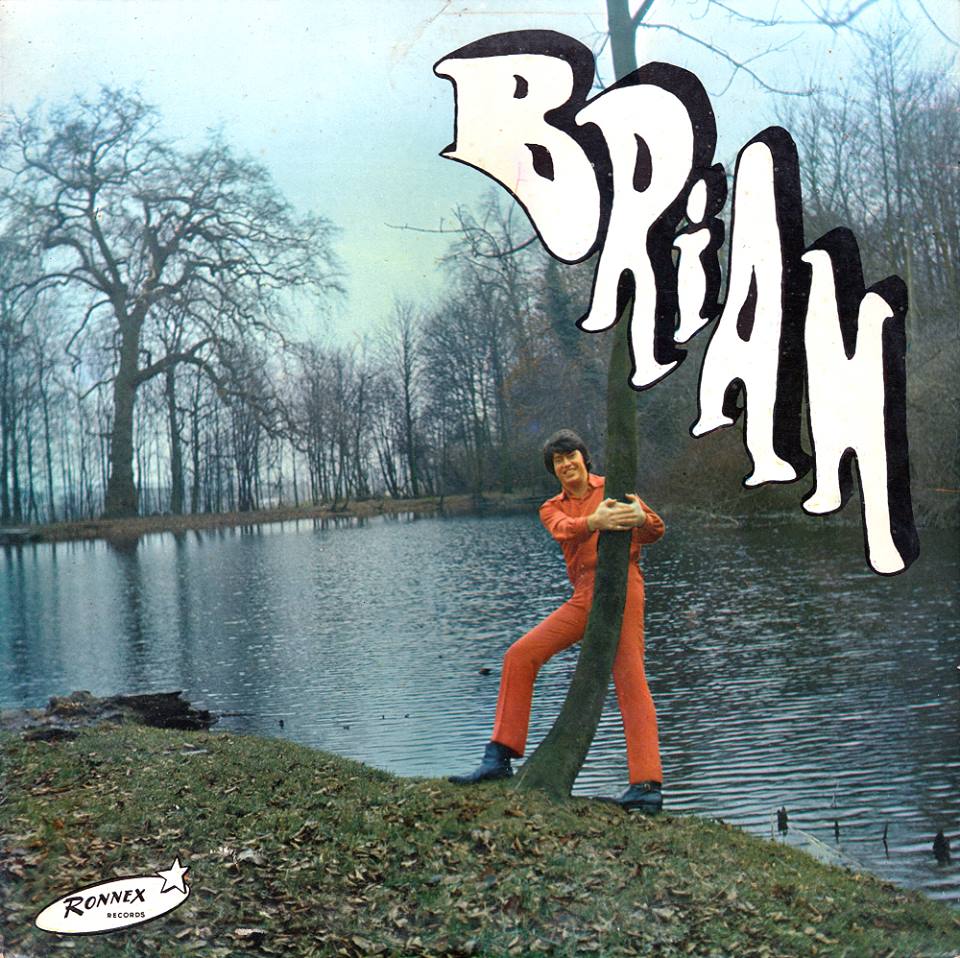
“Poinciana” / “Do-dum-dum” (Ronnex 1378) by Brian & the Hi-Five was released in January 1968 and got to number 20 in the Belgian Hit Parade. Until 1970, seven more 45s on Ronnex, and one on MCA Records were to follow. His last record, “The Rainmaker” / “World of Evergreen” (MCA 2028, 1970), contained a Harry Nilsson cover on the A-side, while the B-side was a Chris Kritzinger song that Brian had edited, so that he was credited as a co-writer. Brian’s cover of “Give and Take” made it to number #9 in the Belgian charts of February ’68 and #2 in March (#30 for all of 1968) – even higher than any Shake Spears record – and “Come Back Girl” (originally released by Jackie Edwards the year before) got to number #10 in July ’68 (#81 in all of 1968). In 1969, “Cara-Lin” climbed to number #9 in March and #18 in April (#66 for the overall year). His 45 successes were also released on two LPs on Ronnex, LP 011 (1968 or ’69) and LP 012 (ca. 1970), together with a couple of tracks that were not released on 45s. The second one of those albums is now rare and sought after as well, ranked with a two-“records” rarity rating in “5001 Record Collector Dreams.”
Looking at these releases, it may appear as though Brian had been far more successful than the Shake Spears, but it has to be considered that these are the Belgian charts only. While Brian was a national phenomenon, the Shake Spears had success in all the Benelux-countries, Germany, and especially in France. Even earlier than in the case of Gene Latter, it became quiet around Brian after 1970, and all that is known about him is that he apparently died in 2008, according to discogs.
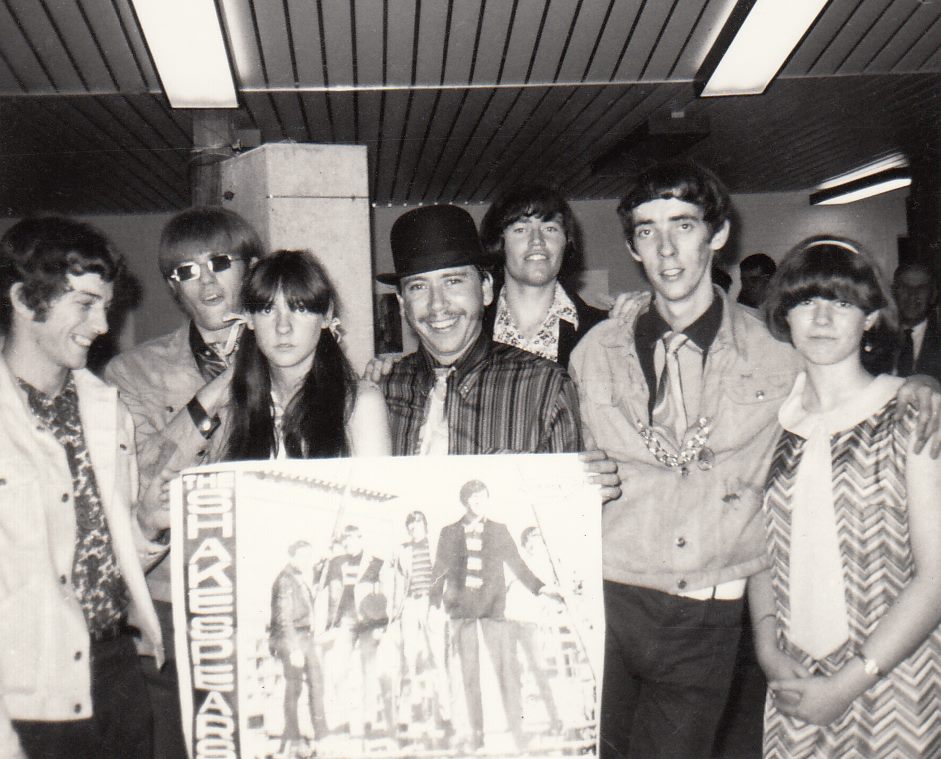
Now in March 1967, the Shake Spears were still looking for the right vocalist, and it was Chris Stone who came up with suggesting a singer he knew from England. Martin Piggot lived in London and was an excellent vocalist according to Chris, so now it was Chris’ task to get him to Brussels as soon as possible so that the group could continue recording and performing.
The Shake Spears did well now with their two new English members, but it was them who became dissatisfied with the management of van Hoogten. The owner and founder of Ronnex Records didn’t have a lot of time to organize their promotion or concert engagements, so now the group needed a new manager who could work for them only. The vacant job would be taken by Jean Jième, a reliable and good support for the band and a friend of Alan’s for the rest of his life.
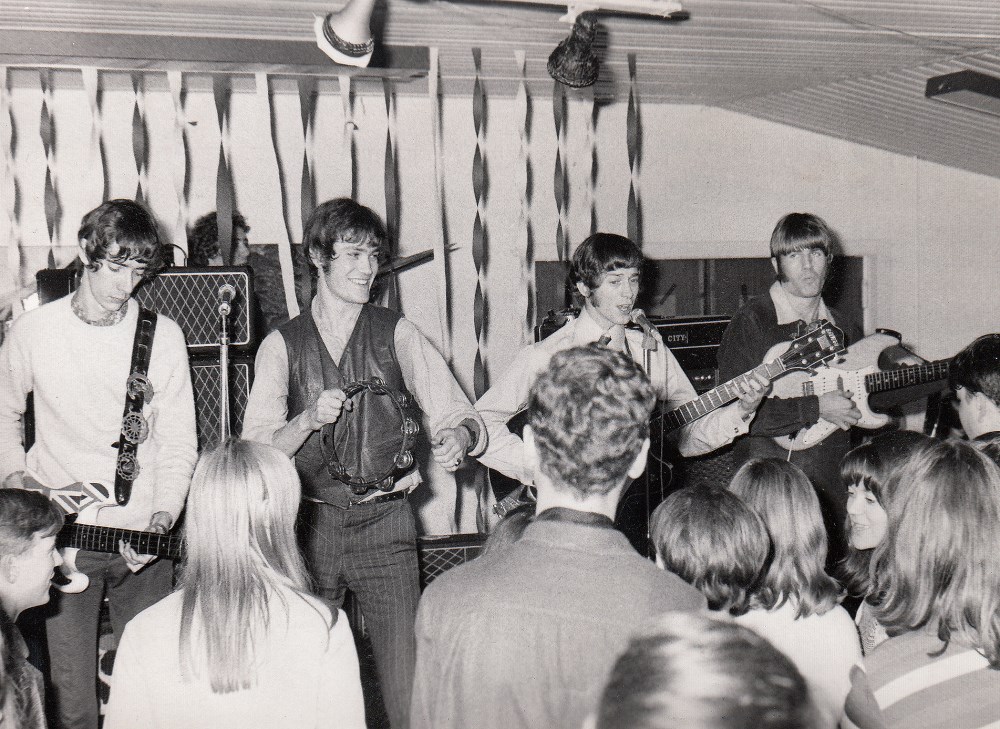
To take a first step, they sent a demo tape to RCA records, which would contain their next big hit. The new single came out in 1968: “Burning My Fingers” / “Something to Believe In” (RCA 54.4025), the A-side being the first big success of Chris Stone, while the B-side was a Chris Kritzinger song, more in the earlier Shake Spears style. “Burning My Fingers” was quite unlike this style, it was more psychedelic, more late-60’s fashioned – their biggest number after “Summertime”.
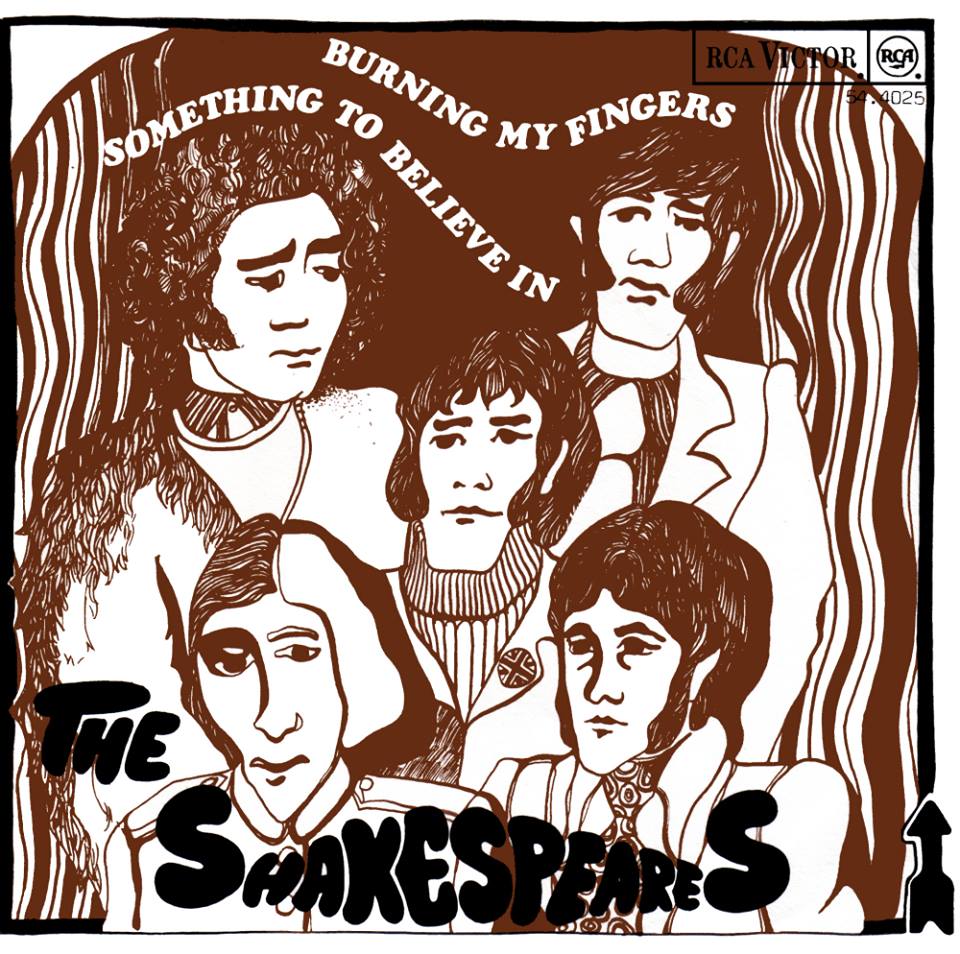
Although “Burning My Fingers” earned them a lot of popularity, tensions within the group steadily grew. Chris Stone and Chris Kritzinger could not agree on a musical direction to take on, both accusing each other of not leaving enough creative space and dominating the whole business. The long hours of playing in small clubs as a “living jukebox” affected the mood of all band members, and Martin and Chris Stone were already thinking of going back to England.
Jième tried to prevent the group from breaking up in this troublesome situation, first by convincing the two Englishmen that it was better for them to stay in Belgium, and trying to reconcile the Stone-Piggott front with the Kritzinger-Kreuger front, who were now beginning to consider going back home, too. To get things going again, Jième had a whole new concept for the band – more physical presence. He envisioned a dynamic, wild show to get the audience out of their seats, Chris Stone’s and Martin’s good looks to attract female audience, and some between-the-songs entertainment by Alan. The revolution of the Shake Spears went even further, as suggestions were made to change the band name. Johnny and Chris Kritzinger were against it, but Alan, Martin and Chris Stone wanted a name that sounded more serious and sophisticated than the funny pun on literature and African spears that are shaken. The allusion to literature stayed, and with a majority of the three against two votes the new name of the group became: Shakespeare.
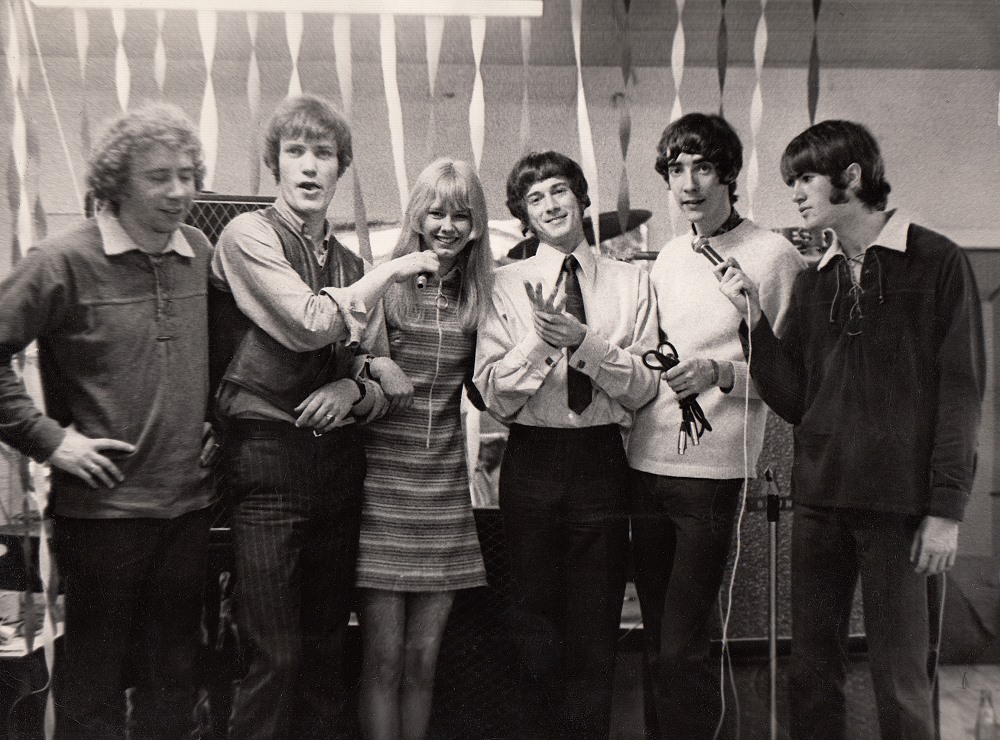
“Burning My Fingers” now even got them into the French TV, and – while the situation between Chris Kritzinger and Johnny and the rest of the group worsened – Jean Jième officially became their new manager.
Chris and Johnny now revealed their plans to return to Rhodesia because they felt homesick, but for Chris the real motivation for leaving was to become a composer and producer as his own career, not just writing for a group that he played in himself. They were allowed to leave, but with a period of notice set at three months. Shakespeare now was facing difficulties to get new contracts with club owners, because they refused to play for more than two hours per night and usually the contracts would require at least four to five hours. Nevertheless, they played with many French stars at the time. Alan recalled:
“[…] because we were ‘famous’ in Belgium we did shows with Jaques Dutronc (Gaston le telefon qui son – big hit in France and Belgium), Johnny Halliday and Michel Polnareff. All Hallidays musicians were English, but I didn’t like him much as he just covered English and American hit songs in French. Dutronc was a very friendly and funny guy, so was Polnareff, especially as he was very short sighted but too proud to wear glasses in public, so when he was talking to you he would screw up his face to see you and look like a cartoon mouse or something. Nice guy, very shy. At least these two guys did original material and we were even thinking about recording one of Polnareff’s songs in English.”
Negotiations with the French TV, which was still interested in “Burning My Fingers”, were still running, when all hopes of getting the final acceptance were suddenly destroyed when the French riots of May 1968 started. Now that there were more important things to be broadcasted than music programs, the chance for Shakespeare to get to play their music on TV was gone.
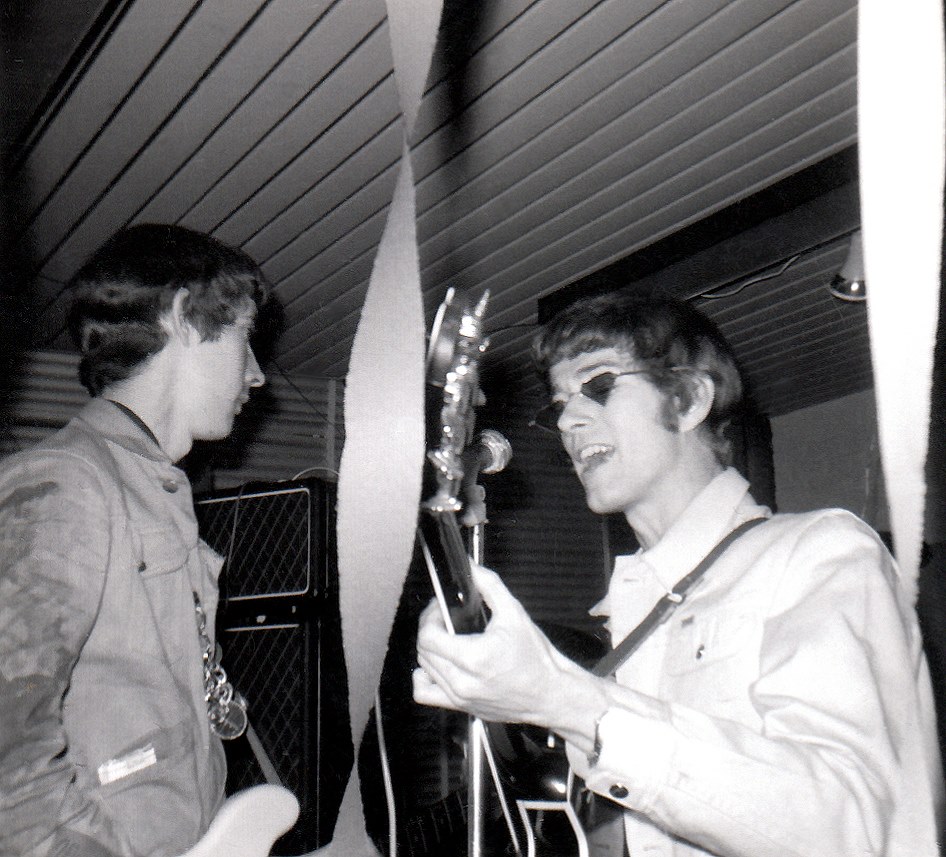
At the same time, replacements for Kreuger and Kritzinger were needed, because in just a matter of time the group would see itself without a guitarist and a drummer. One day Shakespeare was the opening act of Michel Polnareff at the Princes Theatre in Antwerp, and they met their future guitarist Georgie Wood. At the time he was just seventeen, but had already played in the established band the Love Affair. Astonished by Georgie’s playing skills, Chris, Martin and Alan decided they wanted to have him as the prime candidate for Shakespeare’s new guitarist – but to avoid discussions and further trouble, Chris Kritzinger and Johnny were not told about this yet.
Soon after, Alan and Chris Stone also found the drummer they were looking for. Attending a concert of Belgian singer Joske Harris, they were totally astonished by the brilliant technique and terrific skills of the drummer in Harris’ backing band. Alan approached him later on and offered him an audition with Shakespeare in Brussels. It took Alan quite a while to convince the guy that he wasn’t telling him a joke, although he spoke some English. Communication problems went on when the drummer was finally asked about his name, which seemed to be impossible to understand for the ears of an Englishman. So he suggested just to call him Randy (his full name then being Randy Ashe), and agreed to come to the audition.
Randy fit well into the group in matters of playing, but didn’t feel enjoy the big city of Brussels because he was used to living in a small town in the north of Belgium.
Chris Kritzinger and Johnny Kreuger were about to leave the group, just one single gig with them was left. When Chris Kritzinger relocated to South Africa, he opened his own business for music production and eventually his company became one of the top music publishers in the country. Since 2001, he lives in Australia and runs his own record label, Transistor Records.
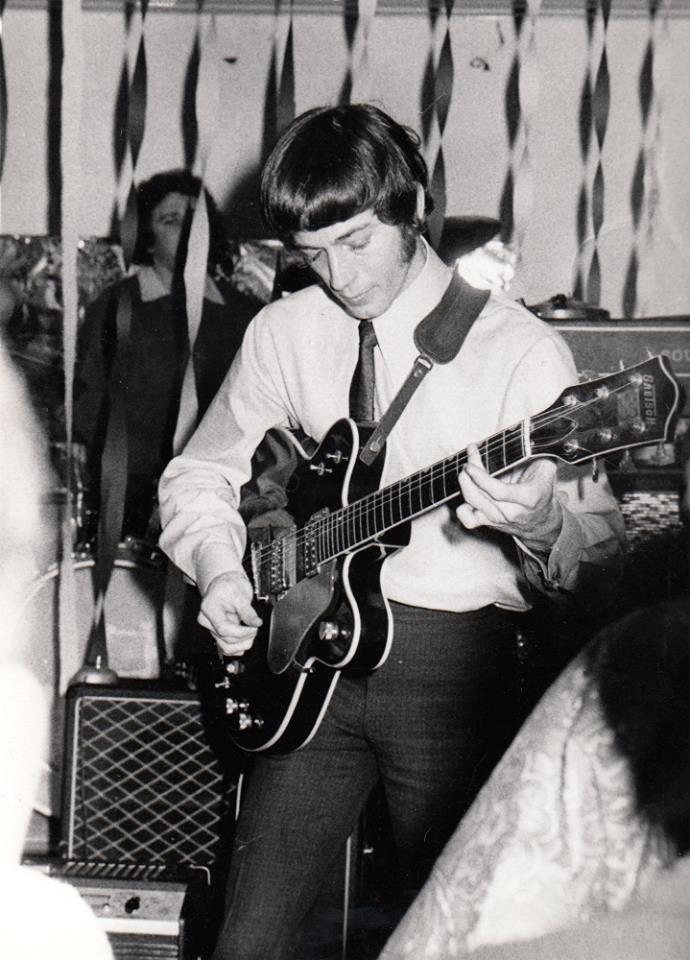
The very last concert of the “old” Shake Spears line-up took place on 30th June 1968; a day after the first one with the new line-up took place in secrecy, on a private party in Geneva. This was extremely successful, due to new stage-outfits and a new light show. But this line up as it was didn’t last long, as Randy soon felt that he could not bear staying in Brussels and in a way he just could not get along with the other guys, staying quiet most of the time and seeming more and more lost. After just a few weeks with Shakespeare, Randy Ashe left and the group were left to find a new drummer who could keep up with Randy’s skills. By chance they were informed that the drummer of Michel Polnareff was available, due to the fact that Polnareff had to abort his tour following the events of May 1968.
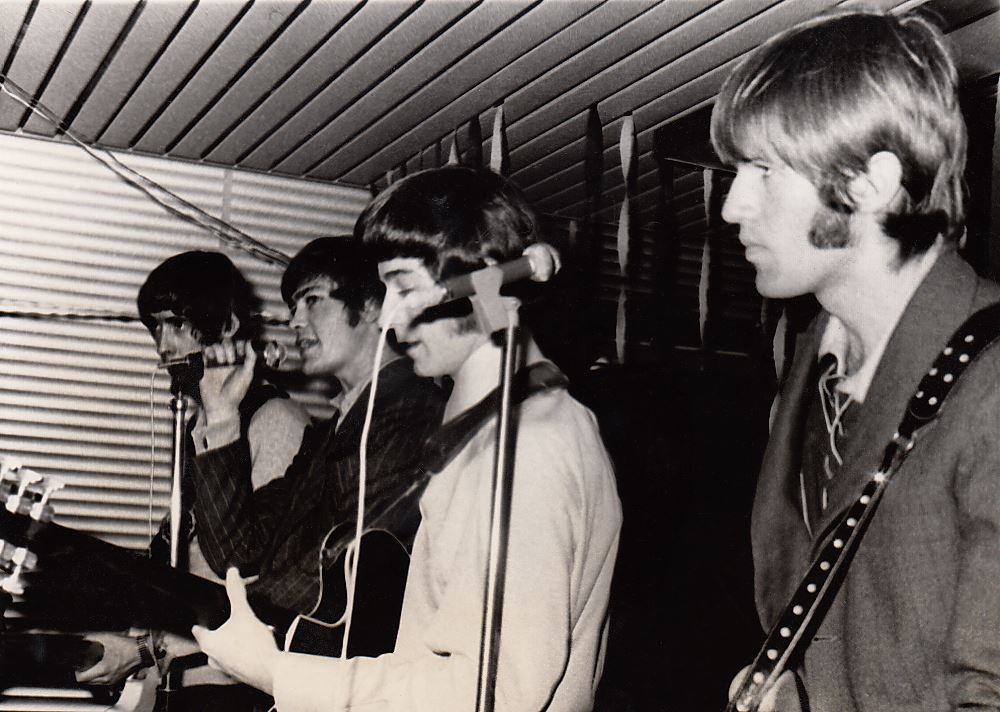
Eventually, Mick Carter (an English guy once again) completed the new Shakespeare line up as their fifth official member, just in time for their new single “How Does She Look” / “Treasure of a Woman’s Love” (RCA 54.4036), which was recorded for RCA. Alan recalled:
“I would love to know what happened to at least another fifteen original songs we recorded for RCA but never released – (they were due for later releases) which were much heavier (with the final line up of the Shake Spears). I know that one of my songs strangely was used on a top selling brand of cigarettes for the advert shown in cinemas for several years in Belgium – Boule d’or cigarettes, and another short clip of a song was used for Alaska Ice-Cream. We were still receiving royalties from these as late as 1976 seven years after the band split up. […]
Probably the most successful one which I wrote completely is called “Big Sleep”, there is also the original guitar version of U S Thumbstyle (done by the 1968 line up of The Shakespeares), and a song called “Turn me on” with the same sort of sounds and double guitar harmonies as Burning my fingers. This last one was recorded (a demo) for Warner Brothers records in the USA as they were interested in Burning my Fingers but as RCA owned the copyright to it they wanted a new song but in the same style. It never got released as The Shakepeares broke up just about the same time as this copy was sent to the USA.”
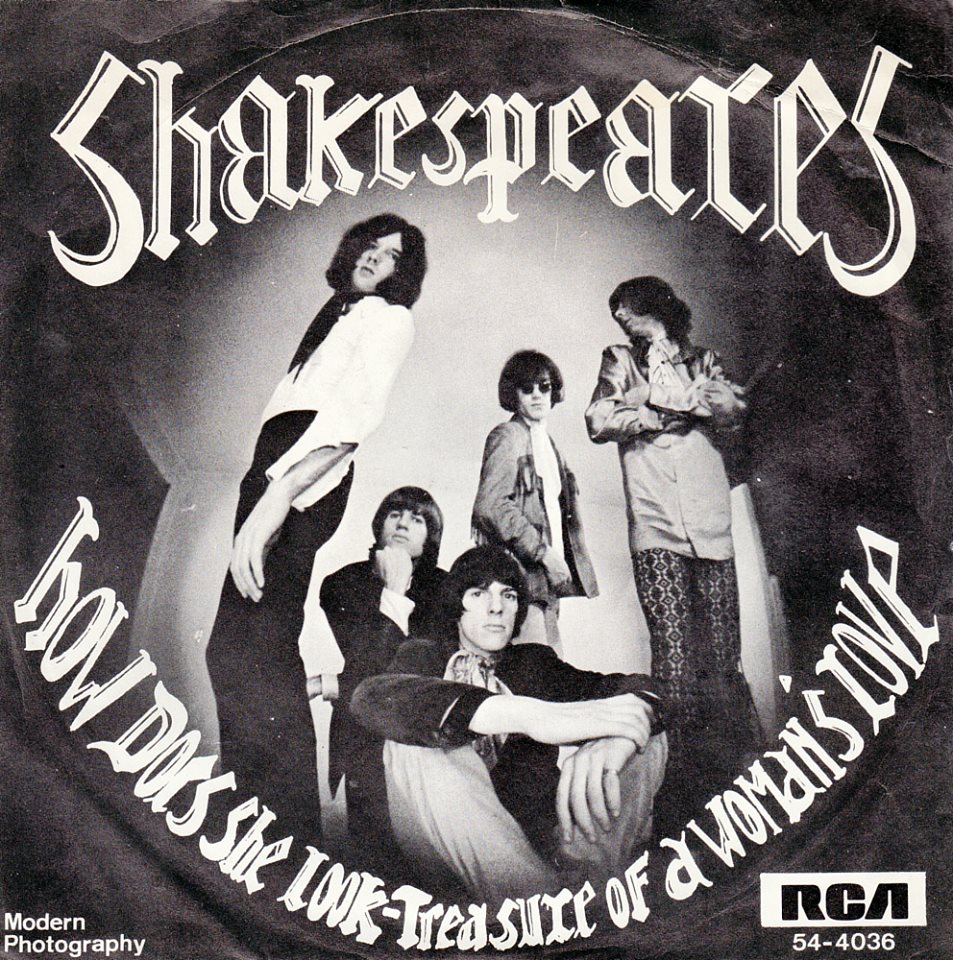
The new record increased their popularity a lot, as did the fantastic live performances of the new line up. Even a music video of “How Does She Look” was shot, on the initiative of and with a lot of effort by Jean Jième, anticipating MTV clips by decades. Rare footage of “Burning My Fingers” appeared on youtube in 2012, but was removed again after a very short time, due to copyright issues.
Not much later the group had to face some serious problems again, as it turned out that not all of them had valid work permits for Belgium. Martin, Alan and Chris had a residence permit valid until 1969, but Mick and Georgie didn’t. While they had worked for Albert van Hoogten they had enjoyed a certain protection, but now they had to take care of such things themselves. The only appropriate solution seemed to be leaving Belgium as soon as possible. So the group secretly disappeared from the scene while Jième still tried to negotiate with the Immigration Office; some went to Paris, the others back to London. Unlike the small Ronnex Records, RCA had no interest in helping the musicians in this situation because their record sales were not financially important to the big label.
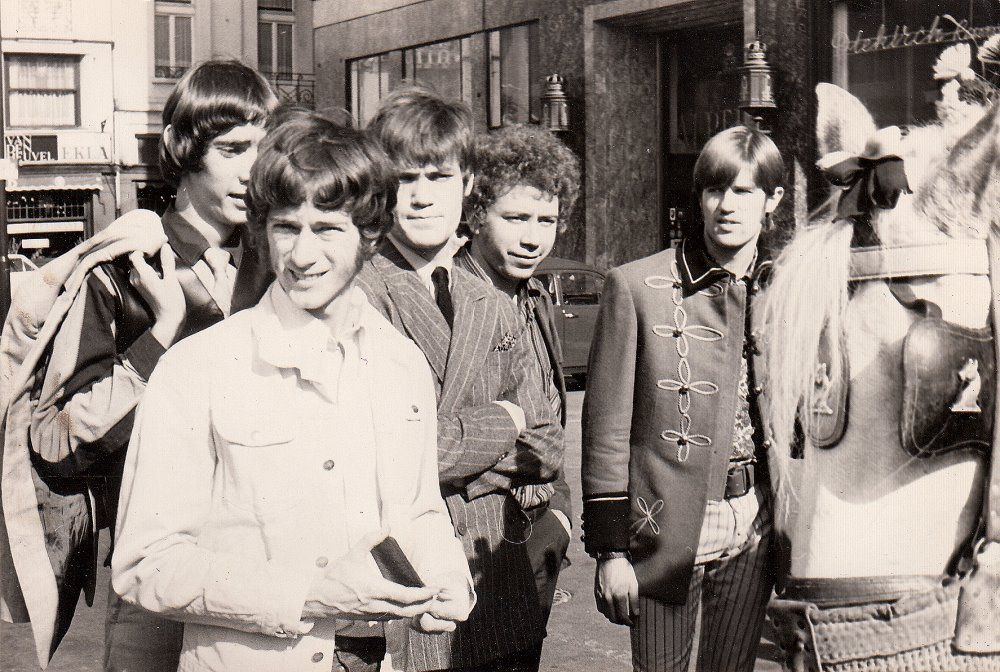
© Jean Jième
Also in secret, Shakespeare returned to Belgium and resumed their concert schedule as if nothing had happened. September and October passed, “How Does She Look” was ranked number 1 in the weekly charts of mosquito TV, but still no more than four thousand copies were sold. The group were fortunate though, as soon afterwards they were approached by a rich, American business man, who was interested in producing a Shakespeare album in the United States. The group were very enthusiastic, especially as this seemed to be a chance for them to get them out of Belgium, where playing and performing was risky.
Their slightly dubious sponsor sent his agent to assess their playing on a live gig, but it didn’t go very well and the agent wasn’t convinced. Her boss though surprised Jième and the group by telling them that he was still interested and financed a trip to Spain for them, so that they could record and play untouched by the Belgian authorities. Down south they were expected to improve their playing skills and record material for the prospective album, and later travel to New York to make the final recordings in top studios.
Jième had a difficult decision to make, as accepting the deal would mean that he had to leave his entire former life in Belgium behind, including his car, his job, and his girlfriend. Meanwhile, Alan had to face different problems. Since a motorcycle accident he suffered as a teenager where he had landed on his jaw, this region of his body had always caused him problems. Just at this time, he had such serious troubles that he had to go to hospital. Since he was not a Belgian citizen and had no permit, he was not covered by health insurance. Luckily, all hospital bills were paid by Shakespeare’s American sponsor. Budgets for plane tickets to Palma, transport of equipment, accommodation, traveling, food, etc., were now being calculated, Shakespeare’s departure was now determined and being planned.
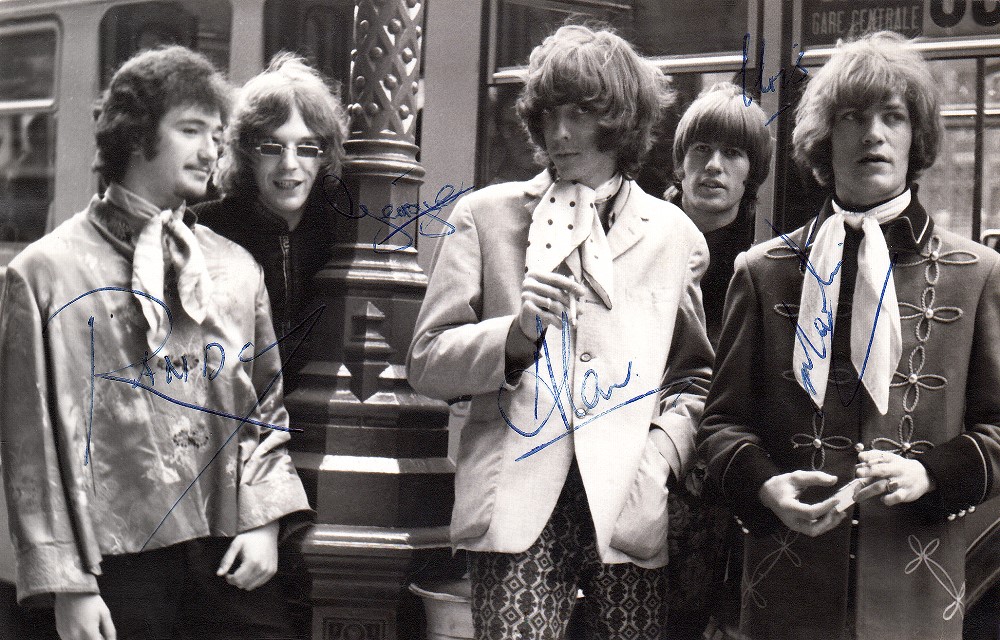
By mid-November it was suggested by the sponsor that the members of the group, as British citizens, should apply for a visa for Spain from their home country, thus they would have to return to England before going to Spain. Their last concert in Belgium took place on the 8th February 1969.
The journey south seemed to be over before it began, when the group found it impossible to get their equipment out of the country, as their patron obviously hadn’t thought about borders and customs. But eventually Shakespeare landed in Mallorca, planning to stay for six months. There they even found their long needed roadie, Ian Kerr – a tough Scotsman with certain love of pranks:
“We first met Ian when he was a DJ at Sergeant Peppers, the biggest club in Majorca, (It was the club owned by Mike Jeffries – Jimi Hendrix Manager). It was huge and held about 1500 people. It always had amazing music with a great sound system. The lighting was very dark as it was a disco, and there was a very big shiny polished steel metal dance floor. The dance floor was surrounded by flashing lights but was also quite dark to give the place atmosphere. The DJ position where he had all the turntables and tape machines etc. was high up at the one side of the dance floor in a thing that looked like a control tower at the airport. Curved windows all around. To get up into the tower there was a closed in staircase in a dark corner of the dance floor, so it couldn’t be seen. One night Ian said to me – Do you want a laugh? Of course I said Yes, so he said come up to the DJ tower with me.
We went up there and he got a length of electric cable with a plug on one end, but bare wires at the other. He plugged it into the wall and then we went back down the stairs and sat on the bottom step where no one could see us, but we could see the whole dance floor.
As it was a holiday place, and the temperature was always quite high, most of the people dancing away to the disco music had bare feet (no shoes on). Ian said – Now watch this. And he tapped the metal floor very quickly with the bare wires from the electric cable.
Everyone on the dance floor jumped – it was like stepping on a lighted cigarette. They would look at their feet to see if they were burnt, but it was such a quick shock the pain almost instantly disappeared and they would carry on dancing again thinking it was their imagination. He would wait a while and then tap the floor again. It was very funny to see all the people jump and not know what had happened, but because of the drink and mood of the place they would carry on dancing and he would spend quite a while making them jump whenever he felt like it.”
Unfortunately, Shakespeare’s Spanish adventure was over when their sponsor suffered a heart attack and the group was forced to return to England as they were left with no money coming in.
This line-up of Shakespeare didn’t last long after their return. Disillusioned by their failed tour to Spain and with no hope of going to the US, the band envisioned no bright future and decided to split up.
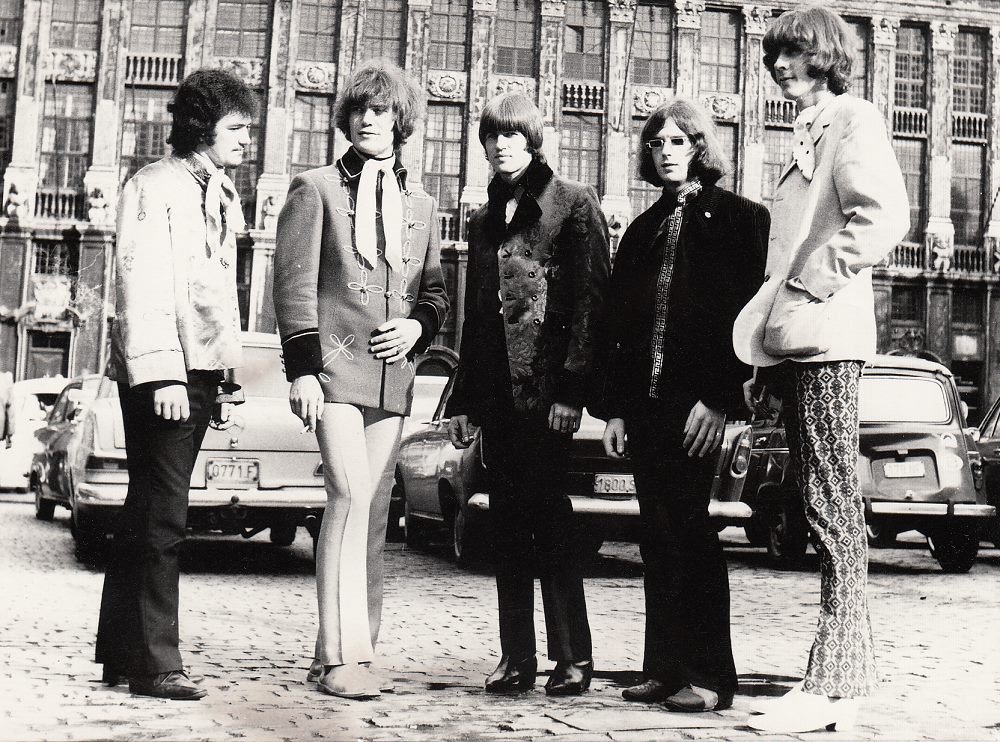
Martin and Georgie left, but Alan (now the senior member of the group), Chris, and Mick had new plans. It just happened that at the same time the English psychedelic-pop / blues-rock band Grapefruit had also disbanded, so they could enlist Grapefruit’s keyboard player Mick Fowler for their new project. They teamed up as an entirely new band, for which they chose the name Fynn McCool (after Finn McCool, originally Fionn mac Cumhaill in Gaelic, a figure in Irish mythology). So in mid-1969 Fynn McCool started as:
Chris Stone – Guitar & vocals
Alan Escombe-Wolhuter – Bass & vocals
Mick Carter – Drums
Mick Fowler – Guitar, piano, lead vocals
The group signed to RCA, which had not only been the Shake Spear’s last record label, but also that of Grapefruit (who were signed to the RCA Dunhill label in the USA), so the company was familiar with both bands and knew about their popularity in Europe, so that it was easier to promote them. Fynn McCool toured through the countries that had been the creative home of the Shake Spears before: the Benelux states, Germany, and especially France.
The 1960’s came to an end, and the new decade looked promising for the group. Soon they started recording at Olympic Studios, and their style would be far different from the Shake Spears. Fynn McCool now was into heavier, progressive tunes – no more pop for Belgian kids. Their first record, “U.S. Thumbstyle” / “Diamond Lil'” (RCA 1956; A-side by Chris Stone, B-side by Mick Fowler) was released in May 1970 and the group’s first album was still being completed, when RCA suddenly decided to release it prematurely in August 1970 – the tracks were not fully worked out and the model that was being built for the cover art wasn’t finished either. The group was anything but pleased, and little did they know at the time that there would never be a finished version of this album. Alan recalled:
“We actually designed the style of the cover for the Fynn McCool album, but RCA Records decided on which picture they wanted on the back. The stoic look was possibly also a bit stonedness as well as coolness. It was winter at 8am so poor light of day and extremely cold. This was in fact the first gatefold sleeve that RCA ever did in England. The model on the front was an idea for mythical Fynn McCool, […] an Irish folk story about a giant who created one of the geographical landscapes between Ireland and England called the Giant’s Causeway. It is a group of huge rocks that stick out of the sea all the way across the Irish Sea between Ireland and England. The myth goes that he (Fynn) threw these into the sea to use as stepping stones to walk across to England. All drawings of him show him with a helmet that had Deer antlers. Like the rest of the record – the model wasn’t quite finished when RCA put out the record, so the finish on it should have been much smoother and realistic. […]
Very 1960’s on the photo on the back. As you can see, I didn’t like the Afghan fur coats that were so popular then. They were awful when they got wet as they would smell like a wet dog. That picture was taken outside Olympic Studios in London by the RCA photographer. It was about -5 degrees [celsius] early morning when we had just finished a eight hour long night in the studio. Considering that I think we looked pretty fresh……. maybe? […]
[On the Fynn McCool album] I actually wrote many of those songs with the other guys. That is how it was with The Shake Spears as well but normally with The Shake Spears if just parts of a song were written by other members of the band they weren’t shown as writers. With Fynn McCool we decided that if all of us were either adding lyrics, or musical passages then we should all get mentioned (for royalties this was important). I actually did the music for the first part of Shattered and then I came up with the rhythm and style with percussion for the second part.”
On the inside of the album’s gatefold sleeve is a note written by an American D.J. at the infamous Rock ‘n’ Roll Circus in Paris where Fynn McCool were regular guests:
“6 A.M. in the Pub just off St. Germain. Mick rabbits about saxophones and doughnuts (he prefers Oranges to Grapefruit). Chris stumbles around the dark corners of the Circus, glass in hand, wondering when the next set is. Ian digs French musicians who jam on the group’s gear, (Ye can’t shove yer granny off the bus) Christmas Eve dinner got together by Dominique. Drummer Mick wants “Old Blue” – again?? Sam’s gonna sing, what? Diamond Lil, – a gas. (Come and do it with). Alan’s in-between-numbers chatter drives the hip French audience wild. Bongos in a bit of state. We’ve all got our problems. Mick picks up the twelve-string guitar, chucks it for six, sits down behind the piano, figures what the hell and decides to do a quick P.A. as D.J.
It is the morning and back to Merrie Ould England and relative sanity.
FYNN MCCOOL. Very together. Nice one chaps….
Cameron Watson,
Rock ‘n’ Roll Circus
Paris 1970. ”
Alan recalled:
“My chat with the French audiences were normally just my sense of humour introducing songs and occasionally making fun of the French in general – although they took it without any offence in good humour. I would deliberately speak with a far worse French accent than I could actually speak, (they call it Franglaise which is an Englishman speaking French). That way I could make deliberate mistakes which could be quite rude but they would excuse them as it was funny to them to hear an English guy speak French. Just a little example… the French word for a kiss is ‘bisu’ and the word for making love is ‘baiser’ (this is the four letter English word for making love if you know what I mean). In French they are almost pronounced the same so I could point out a good looking couple and say – when you say goodnight to your girl tonight, don’t forget to kiss her, but of course I would deliberately use the wrong word for kiss and they would believe that I had just made a silly mistake and all laugh. There were many things that just came into mind while I was announcing things.”
Fynn McCool turned out to be a fluctuating group, as by the time the album (recorded with the initial line up) came out, the line up had already been changed, as two more ex-Grapefruit members, Bob Wale (replacing Chris Stone on guitar) and Geoff Swettenham (brother of Pete Swettenham; replacing Mick Carter on drums) were recruited in July. Bob Wale had joined Grapefruit in spring 1969, and had been a key figure in the group’s immediate change of style from sweet baroque pop to heavier tunes. Vik Tedeschi, a Swiss-German Jazz musician, joined on saxophone, oboe and flute, but for just a couple of months.
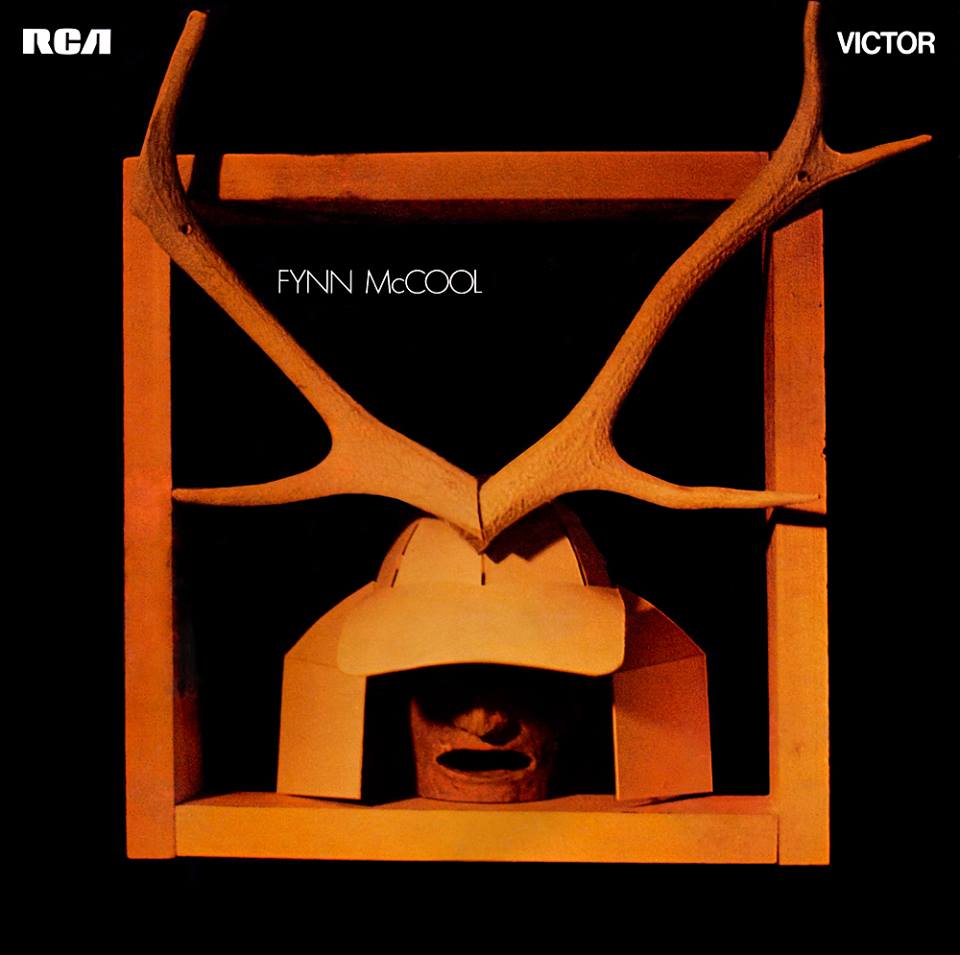
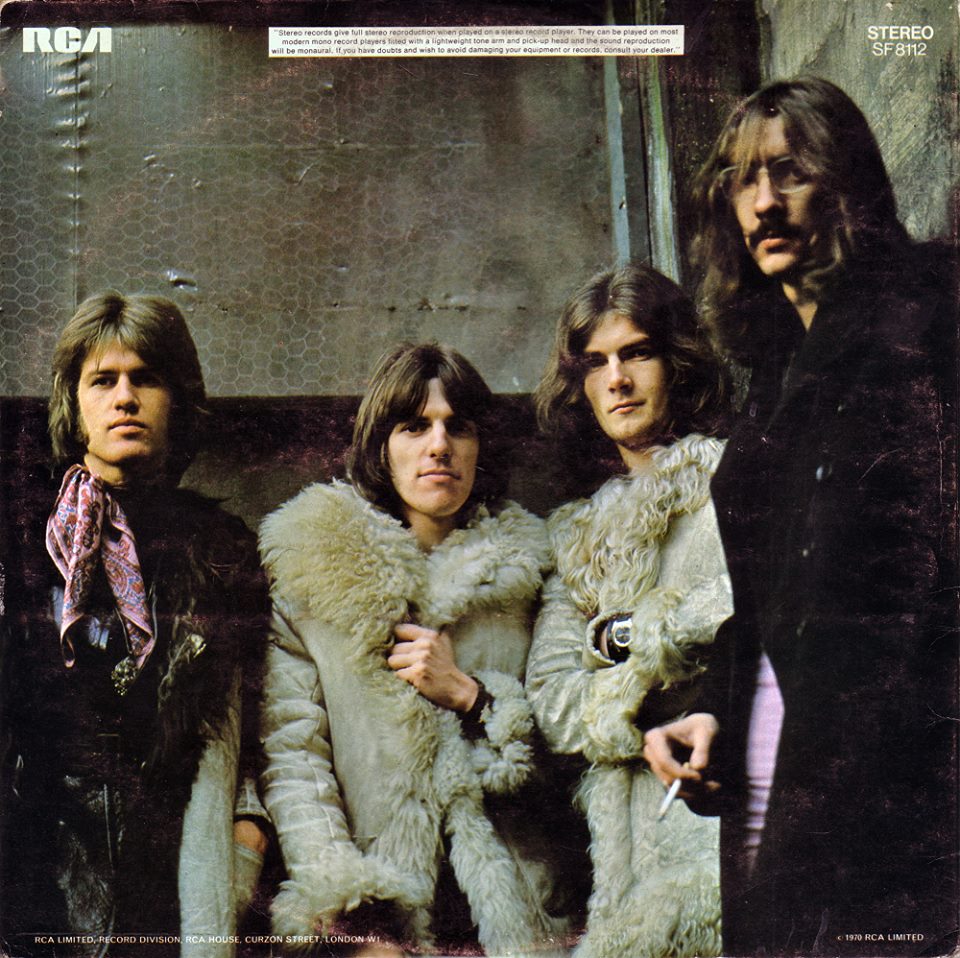
Mick Carter’s whereabouts after Fynn McCool remain unknown. Chris Stone, however, left the playing side of music business and started to work in the promotions department of Decca Records, where he and Alan met again a couple of years later. He later became the head of promotions of Apple Records and eventually ended up as a director of promotions and video for BMG in England. When a footage of the Shake Spears playing “Burning My Fingers” had appeared on youtube not long ago, Chris had provided the following piece of information to accompany the video:
“A 5 piece band without an easily discernible ‘sound’, The ShakeSpeares diverse style was forged in the musical melting pot of the 60s.
Growing up on a diet of British pop and US soul, the group whose members assembled from as far afield as Africa & England, wandered from London pubs to Paris clubs, mainly paying the rent with mind-numbing 6 hour gigs in Belgium circus tents. Originally signed to a Belgian record label, and subsequently picked up by RCA, the band enjoyed more live success than record success until the release of this single ‘Burning My Fingers’.
An instant hit on French Radio the song was featured as ‘Disque Rouge’ on the new Paris TV programme ‘Bouton Rouge’.
As fate would have it, their overnight breakthrough coincided with the start of the famous Paris riots of 1968, with police battling students on the streets and over 11 million people joining in the biggest general strike in the history of France. Record stores stopped reporting sales, and the charts ceased to function.
When normality returned, the world had moved on and ‘Burning my Fingers’ had disappeared into history. Soon afterwards the band split, with some members reforming as Fynn McCool, and signing to RCA in London.
Guitarist Chris Kritzinger subsequently returned to Africa and formed his own music production company. He again relocated, this time to Australia where his Transistor Records became one of the most successful Australian independants.
Bassist Alan Escombe moved on and joined the biggest rock’n’roll shipping company in the world – RockIt Cargo, becoming a director of the company, responsible for the logistics of the mega stadium gigs of U2, Rolling Stones, Michael Jackson, Madonna & the Eagles.
Guitarist Chris Stone became a record promoter with Decca Records in London, worked for the Beatles at Apple Records in Savile Row, and following a lengthy spell at Chrysalis working with Jethro Tull and Blondie, became Senior VP International at Sony/BMG overseeing the European development of key RCA and Arista artists such as Whitney Houston and Take That.”
Only two months later the group again got a new guitarist when Glen Turner took the place of Bob Wale, who joined Hard Meat in November 1970. Glen turned out to be a rather tragic figure in the music scene, but he also was the key to an interesting encounter for Alan:
“Later in Fynn McCool we took on a guitarist Glenn Turner (who replaced Bob Wale of Grapefruit in Fynn McCool). Glenn had been with Chris Stainton and Joe Cocker when he was still only 14. He was a guitar genius but was too young to tour overseas with Cocker and that is why he joined us. Unfortunately getting into the business so young, by the time he was 18 he was really into heavy drugs and that is when we had to get rid of him. Sadly he is probably dead by now as we never heard anything more about him.
Peter Sellers was God Father to Paul Kossoff of Free. His father David Kossoff was also a famous actor in England and a very good friend of Peter Sellers, that’s why Sellers was so interested in Paul’s career. On one occasion I was in the best known Guitar shop in London (Sound City) with our guitarist [Glen] buying guitar strings when Peter Sellers came in and asked the guys behind the counter which was the best guitar they had. They showed him a Vintage Gibson Les Paul (which was extremely expensive at the time) and told him that this was the guitar of choice for Jimmy Page and loads of other Blues guitarists, Sellers turned to us and said – can you guys play guitar? Glen of course said he could (and in fact he was an amazing guitarist). He then spent fifteen minutes playing the Les Paul showing how all the tone controls worked and the different sound available. Peter Sellers told us he needed it to be good as his God son (way before Free days) was learning guitar and he wanted to give it to him as a present. Amazing that I always recognised that guitar whenever I saw Free on TV.”
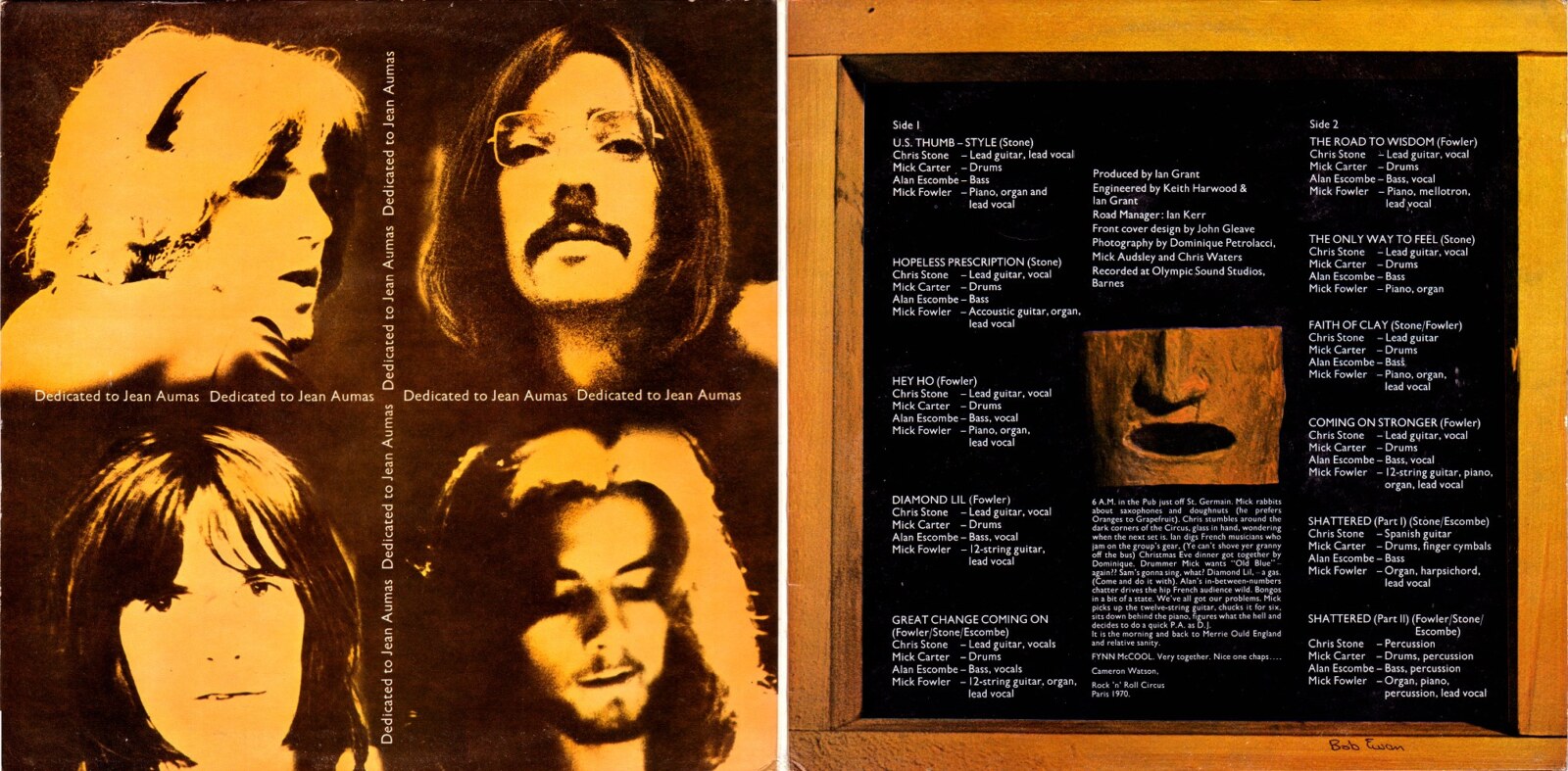
The occupants of the position as Fynn McCool’s lead guitarist seemed to change every couple of months, so by March 1971 another new member joined the group. Garth Watt-Roy had formerly played in the Greatest Show on Earth (which he had founded with his brother Norman), and would later join East of Eden after they had their big break-through with “Jig-a-Jig” (which was to remain a one-hit-wonder though). When the days of Fynn McCool were numbered, Alan and Garth teamed up for a short lived group, which unfortunately did not release any records:
“Another EXTREMELY rare recording that exists was by a band called GARTH. Very heavy Led Zepplin style three piece band, just guitar, bass and drums (like Hendrix). It was me on bass, Garth Watt-Roy on guitar and vocals, and Paul Francis on drums. This was just as Fynn McCool were breaking up. Garth asked me if I would be interested in forming a band with him. He was an amazing guitarist and singer and Paul was a brilliant drummer. We did one audition for A & M records who immediately said they would sign us, and they put us in a studio for two days and we recorded four demos. Two days after we had recorded them, Paul Francis phoned me and told me Garth had been asked to join East of Eden who had a record at number one in the charts (Jigger Jig). As he had been offered a lot of money Garth left straight away. There is a bit about Garth on the internet. He had been in the following bands, The Greatest Show on Earth, Fuzzy Duck, East of Eden, Paul Young and The Cue Tips and the last I heard he was with The Barron Knights. (His brother Norman was bass player for Ian Dury and The Blockheads). Garth would have copies of the demos we did. We only did one live show together arranged by A & M records and it was incredible as the crowd went absolutely mad (about 4,000 people at The Sheffield Civic hall). The other band that night was Slade, who went on to become huge in England in 1970/71.”
The last major line up change included the departure of Geoff Swettenham, who to this day continues to play as a session musician in England. And as Garth Watt-Roy had also sought his fortune elsewhere, only Mick and Alan were left as original members. Fynn McCool’s final line up by mid-1971 consisted of:
Steve Krieger – Guitar & vocals
Alan Escombe-Wolhuter – Bass & vocals
Ken (Ginger) Dixon – Drums
Mick Fowler – Guitar, piano & lead vocals
Peter Arnesen – Piano & vocals
The band broke up in February 1972, the completed version of their album was never released. The uncompleted version has been re-released unofficially on the label “Prog Temple”, in both a vinyl and a CD edition, but those releases are pirated as nobody receives any royalties from them (please wait for the official re-release instead of buying those).
Austrian Peter Arnesen later joined the pop band the Rubettes in 1973, Kenneth Dixon appeared on the 1974 album “Aslan Is Not a Tame Lion” by Narnia, and Steve Krieger and Mick Fowler completely disappeared from the music scene.
Alan Escombe continued playing for a couple of years in several bands, and then decided to leave the stage in favour of a job behind it:
“After our band split up in 1974 I was looking for a job in the record industry and one of the companies where I went for an interview was Decca (as Chris Stone from The Shake Spears was already working there in the promotion department). My meeting was in the A & R department (the department responsible for finding artists and arranging recording) and I was introduced to the head of the department, Dick Roe – the guy who famously turned down the Beatles. As it happened the guy who interviewed me told me that Decca was starting to take a different direction and I went to a couple of shows with him. They were looking to start signing Punk bands. I […] always hated Punk music – maybe apart from The Clash. I turned down their offer of a job.
Just adding to the little bit about me going for an interview at Decca – the A & R guy who introduced me to Dick Roe told me that because Dick Roe turned down the Beatles the very next group to send him a demo tape – no matter how bad it was he had decided to sign. It was The Rolling Stones – and believe me I am sure that their demo tape was absolutely terrible as they have always been very rough and ready […].”
Now (temporarily) turning his back to music business, Alan eventually ended up with a job in a company handling fine art and antiques. Not fully satisfied by this occupation, he already started establishing contacts with producers and managers handling bands and tours.
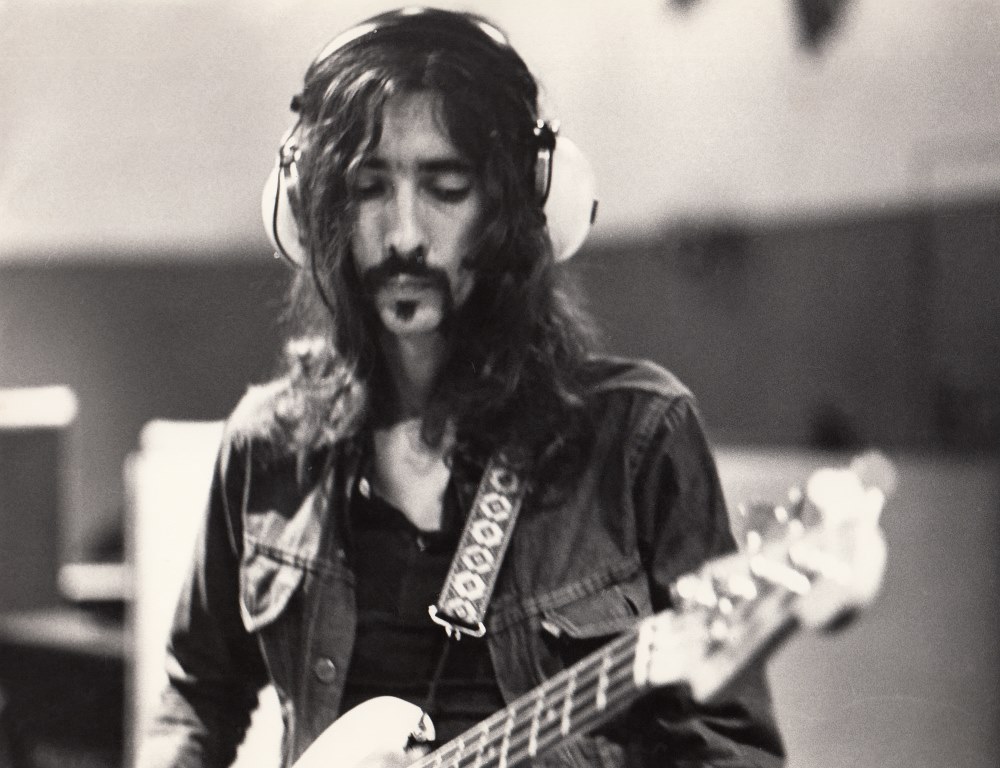
In 1978, together with a young chap named David Bernstein, he opened a company handling world-wide airfreight and oceanfreight for groups on tour: Rock-It Cargo. To this day, it is the biggest company of its kind, handling tours for countless groups and artists, with big names among its clients like the Rolling Stones, U2, Paul McCartney, Madonna, Bob Dylan, and many others, David Bernstein being the head of the whole business. Having worked in this business for nearly thirty years, Alan seemingly got the job that many of us perhaps were always dreaming of:
“I was fortunate enough to meet and hang out with guys like Jim Morrison, Jimi Hendrix, George and Paul (Beatles) to name a few. It was a pretty cool career I had, but plenty of stress as tours and equipment became huge once the open air concerts became a regular thing. […]
Most people can’t really understand what I did for a living as they always imagine that a band carries a few guitars and amplifiers so when I tell them that in fact doing an international world tour with a band like U2 with 1250 tons of equipment requiring 98 trucks, or The Rolling Stones with 900 tons of equipment and 78 trucks, either flying all the equipment requires 7 or 8 Jumbo 747 freighter aircraft, or 7 Antonov Russian freighters aircraft which are bigger than a 747. People don’t realise that everything goes, 70 tons of lights, 40 tons of sound system, 18 tons of catering equipment etc., and if the band are playing outdoor stadiums they carry 3 of their own outdoor stages. Each stage is 325 tons of steel requiring 18 x 12metre containers or trailers. We would move a show for instance from Wembley Stadium London on a Saturday after the concert finished to [New Jersey’s Giants Stadium] for a show on the Monday night, so everything flew on the Sunday, was customs cleared and delivered to the stadium by 06:00 on the Monday for set up. […] we handled around 300 to 400 bands, I would be working on two or three bands at a time so flying around the world non stop supervising moves from UK to USA, or USA to Tokyo, Germany to Rio. We had at least ten of our guys doing the same out of the USA and UK with other bands, so a really flat out hectic business.”
Alan retired to Australia with his wife in 2005. There, Alan had played bass in his son’s band “The Lords of Byron” and had begun working on remastered versions of all the Shake Spears and Fynn McCool material. Sadly, after a brave battle with severe illness, Alan Escombe passed away on 17th October 2015. And with him, a true legend of rock music history left us, still deeply missed by family and friends.
His son, Luke Escombe, who moved to Sydney in 1999, became a musician just like his father, and released his debut album “Golden Ages” in 2008. The live DVD “Chronic Illness” followed in 2010. Watch, listen to or buy his CDs and DVDs here: lukeescombe.com.
Recently Luke has been working on a 5-part radio series on the life of his father, called Rock and Roll Dad. Clicking on the name will take you to the facebook page Luke has set up for this project where you can stay up to date on when and where it airs and lots of memorabilia that Luke keeps digging up like never before seen photos and more – stay tuned!
Alan’s daughter, Melanie, is a rock music photographer in Los Angeles, shooting professional pictures of Elton John, Billy Joel, Iggy Pop, Status Quo, Johnny Winter, and many others. You can see her amazing work here: melanieescombephotography.com and read an interview with her here.
The Shake Spears and Fynn McCool are probably not among the best remembered bands of the 1960s and 70s, but their musical output always had a unique quality that was much appreciated by the dance crowds of the time and record collectors. And even today, in the age of the internet, social networks, and vinyl rips being readily available on youtube, etc., their popularity seems to grow steadily. Let’s salute these heroes, for they have created something, danceable as well as mind-expanding, that will entertain many more generations of music lovers.
– Sarah Steffen
Shake Spears Line up changes
The Phantoms, ca. 1961
Two members of this group would later become members of the Shake Spears.
Mike Westcott – Vocals
Chris Stone – Lead guitar
Mike London – Rhythm guitar
Alan Escombe-Wolhuter (b. 16th August 1945 – d. 17th October 2015) – Bass
Grahame Ross – Drums
The Dynamics, ca. 1963
In 1964 the name would be changed into “The Shake Spears”.
Chris Kritzinger (b. 12th Dec 1941) – Keyboard, lead guitar & vocals
Perry Jordaan (b. 1942?) – Guitar & vocals
Johnny Kreuger (b. 1944?) – Drums & vocals
Calvin “Cal” Coleman (b. 1944?) – Bass & vocals
Feb. 1965, as the Shake Spears
Calvin Coleman leaves and is replaced by Alan Escombe from the Phantoms.
Chris Kritzinger – Keyboard, lead guitar & vocals
Perry Jordaan – Guitar & vocals
Johnny Kreuger – Drums & vocals
Alan Escombe-Wolhuter – Bass & vocals
Gene Latter (born Arthur Ford) – Lead vocals
Linda Millington – Vocals (Feb. to June 1965)
Jun. 1965
Linda Millington’s engagement ends, Australian Saxophonist Ron Patton joins after touring with Roy Orbison.
Chris Kritzinger – Keyboard, lead guitar & vocals
Perry Jordaan – Guitar & vocals
Johnny Kreuger – Drums & vocals
Alan Escombe-Wolhuter – Bass & vocals
Gene Latter – Lead vocals
Ron Patton – Saxophone
Feb. 1966
Gene Latter leaves.
Chris Kritzinger – Keyboard, lead guitar & vocals
Perry Jordaan – Guitar & vocals
Johnny Kreuger – Drums & vocals
Alan Escombe-Wolhuter – Bass & vocals
Ron Patton – Saxophone
Jun. 1966
Chris Kritzinger – Keyboard, lead guitar & vocals
Perry Jordaan – Guitar & vocals
Johnny Kreuger – Drums & vocals
Alan Escombe-Wolhuter – Bass & vocals
“Doc” Jones – Vocals
Ron Patton – Saxophone
Nov. 1966
Chris Kritzinger – Keyboard, lead guitar & vocals
Perry Jordaan – Guitar & vocals
Johnny Kreuger – Drums & vocals
Alan Escombe-Wolhuter – Bass & vocals
Brian Bastow (29th October 1943 or 5th May 1944 – 22nd March 2008) – Vocals
Feb. 1967
Perry Jordaan returns home to South Africa and is replaced by Chris Stone from the Phantoms.
Chris Kritzinger – Keyboard, lead guitar & vocals
Chris Stone – Guitar & vocals
Johnny Kreuger – Drums & vocals
Alan Escombe-Wolhuter – Bass
Brian Bastow – Vocals
Mar. 1967
Brian Bastow leaves in order to pursue a solo carrier. Later, “The Shake Spears” become “The Shakespeare”. Chris Kritzinger and Johnny Kreuger plan to return to Rhodesia.
Chris Kritzinger – Keyboard, lead guitar & vocals
Chris Stone – Guitar & vocals
Johnny Kreuger – Drums & vocals
Alan Escombe-Wolhuter – Bass & vocals
Martin Pigott – Vocals
Jun. 1968
ex-Love Affair member Georgie Wood and Randy Ashe, drummer of the backing band of Joske Harris, are recruited as replacements for Kritzinger and Kreuger.
Chris Stone – Guitar & vocals
Alan Escombe-Wolhuter – Bass & vocals
Martin Piggott – Vocals
George Wood – Lead guitar & vocals
Randy Ashe – Drums
Aug. 1968
Mick Carter, who had been touring with Michel Polnareff, joins after Randy Ashe leaves.
Chris Stone – Guitar & vocals
Alan Escombe-Wolhuter – Bass
Martin Piggott – Vocals
George Wood – Lead guitar & vocals
Mick Carter – Drums
Late 1968, as Fynn McCool
Mick Fowler, a former member of Grapefruit, joins.
Chris Stone – Guitar & vocals
Alan Escombe-Wolhuter – Bass & vocals
Mick Carter – Drums
Mick Fowler (b. 25th July 1948) – Guitar, piano & lead vocals
Jul. 1970
Two other ex–Grapefruit members, Bob Wale and Geoff Swettenham, join. Vik Tedeschi, a Swiss/German Jazz musician, joins for a couple of months.
Bob Wale – Guitar, harmonica & vocals
Alan Escombe-Wolhuter – Bass & vocals
Geoff Swettenham (b. 8th March 1948) – Drums
Mick Fowler – Guitar, piano & lead vocals
Viktor Tedeschi – Saxophone, oboe & flute
Sep. 1970
Bob Wale is replaced by Glen Turner.
Glen Turner – Guitar & vocals
Alan Escombe-Wolhuter – Bass & vocals
Geoff Swettenham – Drums
Mick Fowler – Guitar, piano & lead vocals
Viktor Tedeschi – Saxophone, oboe & flute
Mar. 1971
Garth Watt-Roy joins. He later left to join East of Eden.
Garth Watt-Roy – Guitar & Vocals
Alan Escombe-Wolhuter – Bass & Vocals
Geoff Swettenham – Drums
Mick Fowler – Guitar, piano & lead vocals
Jun. 1971
Peter Arnesen joins. He later left to join The Rubettes.
Steve Krieger – Guitar & vocals
Alan Escombe-Wolhuter – Bass & vocals
Ken (Ginger) Dixon – Drums
Mick Fowler – Guitar, piano & lead vocals
Peter Arnesen – Piano & vocals
Fynn McCool broke up in February 1972.
Shake Spears Discography & Related Discographies
The Shake Spears
1965 7″ Shake It Over / Cry For Your Loving Belgium Ronnex 1336
1965 7″ Midsummernight’s Dream / Brussels Bound Belgium Ronnex 1339
1965 7″ Do That Again / Don’t Play Funny Games Belgium Ronnex 1347
1965 Jun 7″ Shake It Over /Do That Again Germany Ariola 18 386 AT
1965 7″ Garden of Eden / Nossi Dan Belgium Ronnex 1352
1965 7″ I Can’t Tell / I Know Belgium Ronnex 1356
1965 7″ The Shake Spear / Give It to Me (mono) Belgium Ronnex 1360
1965 7″ The Shake Spear / Give It to Me (stereo) Belgium Ronnex 1361
1965 7″ The Shake Spear / Give It to Me Germany Ariola 18 548 AT
1966 7″ The Shake Spear / Give It to Me Mexico Orfeon 45-1881
1965 7″ I’ll Go Crazy / Stop Playing That Song Belgium Ronnex 1365
1966 7″ I’ll Go Crazy / Stop Playing That Song Denmark Ronnex STU 42252
1966 7″ Summertime / What Happened Belgium / France Philips 319763
1966 7″ Summertime / What Happened Germany Ariola 19 166 AT
1966 7″ Summertime (EP) France Barclay 071036
1966 LP Give It to Me Netherlands Philips QL 625 276
1966 Jul 7″ The Saint / Lucifer Belgium Ronnex 1366
1966 7″ The Saint / Lucifer Belgium Ronnex R 1366
1966 7″ The Saint / Lucifer Netherlands Fontana 278 120 YF
1966 7″ The Saint / Lucifer Italy RT Club RT 1522
1966 7″ The Saint / Lucifer Denmark Ronnex STU 42551
1966 7″ Candle promo Belgium Moonglow M-5020-1
1966 7″ Candle / Jerk Belgium Ronnex 1372
1967 7″ Candle / Our Life Italy RT Club RT 1545
1968 7″ Our Life / Ma-pah Belgium Ronnex 1377
1968 7″ El Santo / Give and Take Spain Acropol A-119
1968 7″ Give and Take / Ma-pah Greece Melody RRG 209
1968 May 7″ Burning My Fingers / Something to Believe In UK RCA 1695
1968 7″ Burning My Fingers / Something to Believe In France RCA 49.850
1968 7″ Burning My Fingers / Something to Believe In Belgium RCA 54.4025
1968 7″ Burning My Fingers / Something to Believe In Canada RCA 57-3464
1968 7″ How Does She Look / Treasure of a Woman’s Love Belgium RCA 54.4036
1977 7″ Summertime / What Happened Belgium Ronnex 1450
1977 7″ Summertime / What Happened Netherlands Ronnex 1450
1978 7″ Summertime / Give It to Me France CBS 6422
1978 7″ Summertime / Give It to Me Netherlands Scramble SRS 510.075
1978 LP Summertime Belgium Tornado 501
1979 LP Summertime Portugal Imavox IM-45001
1965 7″ Do That Again / Shake It Over Greece Melody RRG 172
196? 7″ Candle / Jerk Belgium Ronnex RO. 1372
1966 7″ Candle / Jerk Greece Melody RRG 197
196? 7″ Shake It Over / Do That Again Lebanon Ruby F-1017
196? 7″ Candle / Jerk (Shake) Lebanon Ruby F.1034
196? 7″ Candle / Jerk (Shake) Lebanon Ruby F-1034
196? 7″ The Saint / Lucifer Turkey RT Club TR 1522
196? 7″ Summertime / What Happened Belgium Ronnex 1450
1977 7″ Summertime / What Happened Belgium Ronnex 1950
1977 7″ Summertime / What Happened Belgium Ronnex 1950
197? 7″ Summertime / What Happened Belgium Ronnex 1950
197? 7″ The Saint / Lucifer Belgium Ronnex R 1366
197? 7″ The Saint / Lucifer Belgium Ronnex 1366
197? 7″ The Saint / Lucifer Belgium Ronnex R 1366
19?? LP Summertime France ABA 3385
19?? LP Summertime Belgium 4M034-62069
Teeny and Tony and the Bushbabies
1965 April 16 7″ This Is The End / It Hurts Me UK Parlophone R 5268
Fynn McCool
1970 May 15 7″ U.S.Thumbstyle / Diamond Lil promo UK RCA 1956
1970 7″ U.S.Thumbstyle / Diamond Lil UK RCA 1956
1970 7″ U.S.Thumbstyle / Diamond Lil France RCA 49.671
1970 LP Fynn McCool UK RCA SF 8112
2013 LP Fynn McCool Prog Temple PTLP8007
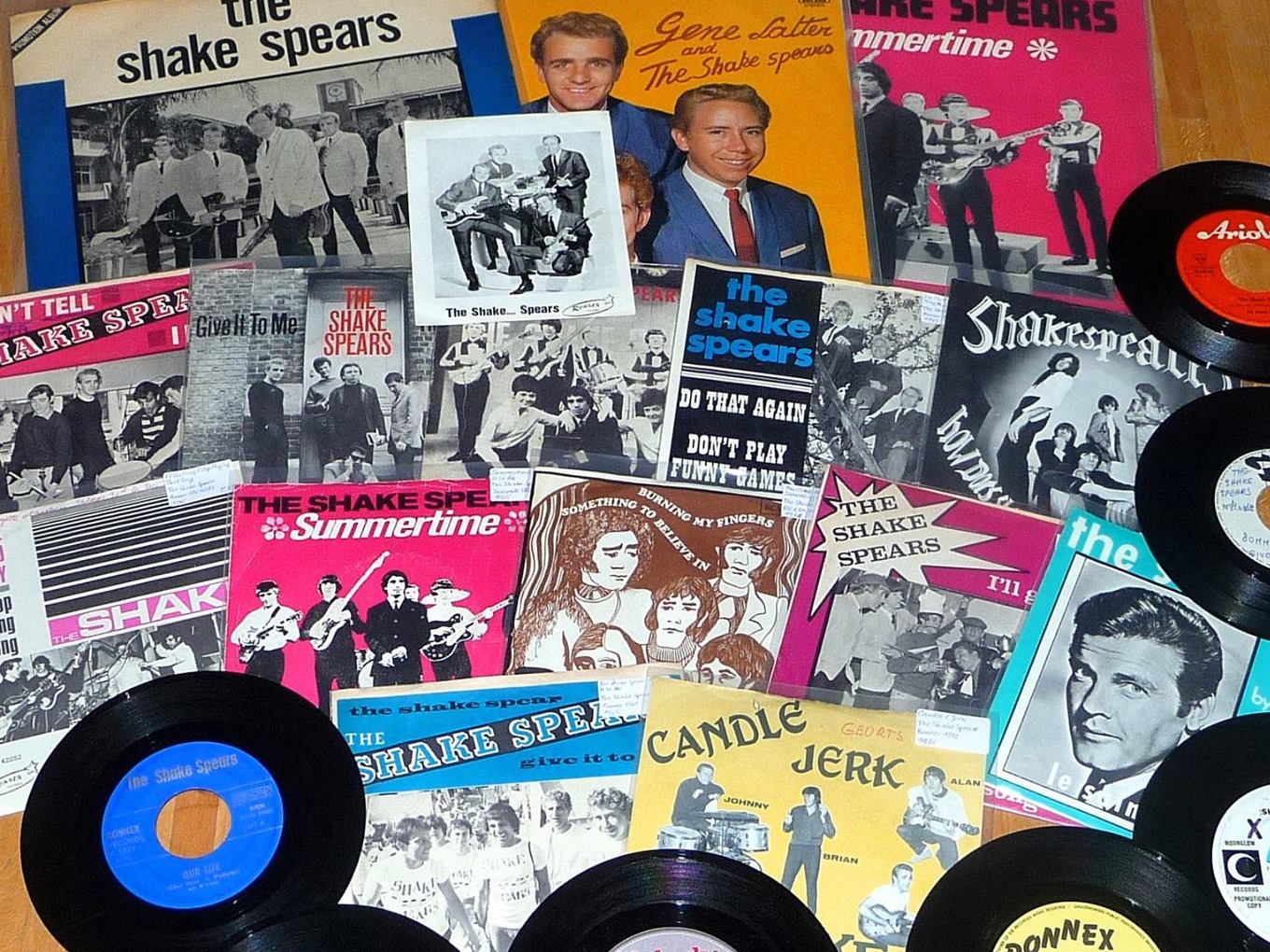
Brian
1967 7″ Poinciana / Do-dum-dum Germany Ariola 19 748 AT
1967 7″ Poinciana / Do-dum-dum Denmark Ronnex STU 42298
1967 7″ Poinciana / Do-dum-dum Netherlands Delta Grammophon DS 1256
1968 7″ Poinciana / Do-dum-dum Belgium Ronnex 1378
1968 7″ Poinciana / Do-dum-dum Belgium Ronnex R 1378
1968 LP Brian Belgium Ronnex LP 011
1968 7″ Look at Me / I’m Gonna Love You Belgium Ronnex 1382
1968 7″ Give and Take / And I Love Her Belgium Ronnex 1385
1968 7″ Give and Take / And I Love Her Netherlands Park BP 1003
1968 7″ Come Back Girl / If I Had My Way Belgium Ronnex 1388
1968 Aug 5 7″ Come Back Girl / If I Had My Way Netherlands Philips JF 333 827
1968 7″ Come Back Girl / If I Had My Way Yugoslavia Jugoton SRX 8204
1969 7″ Too Late for Tears / I Will Stay Belgium Ronnex 1395
1969 7″ Cara-Lin / Time Belgium Ronnex 1398
1969 Dec 09 7″ The Girl Who Plays the Bass Guitar / Half Hearted Germany Saga OPP 42
1970 7″ The Girl Who Plays the Bass Guitar / Half Hearted Belgium Ronnex 1406
1970 7″ Money and Love / Just One More Time Belgium Ronnex 1415
1970 LP Brian Belgium Ronnex LP 012
1970 7″ The Rainmaker / World of Evergreen Belgium MCA 2028
1971 7″ Too Late for Tears / Kiss Me Some More Canada Much International CH 2501
1978 7″ Give and Take / I’m Gonna Love You Belgium Ronnex R 1453
1978 7″ Give and Take / I’m Gonna Love You Belgium Ronnex R 1453
196? 7″ Poinciana / Do-dum-dum Sweden Olga SO 53
1968 7″ Give and Take / And I Love Her Belgium Ronnex R. 1385
197? 7″ Poinciana / Do-dum-dum Belgium Ronnex R 1378
197? 7″ Poinciana / Do-dum-dum Belgium Ronnex R 1378
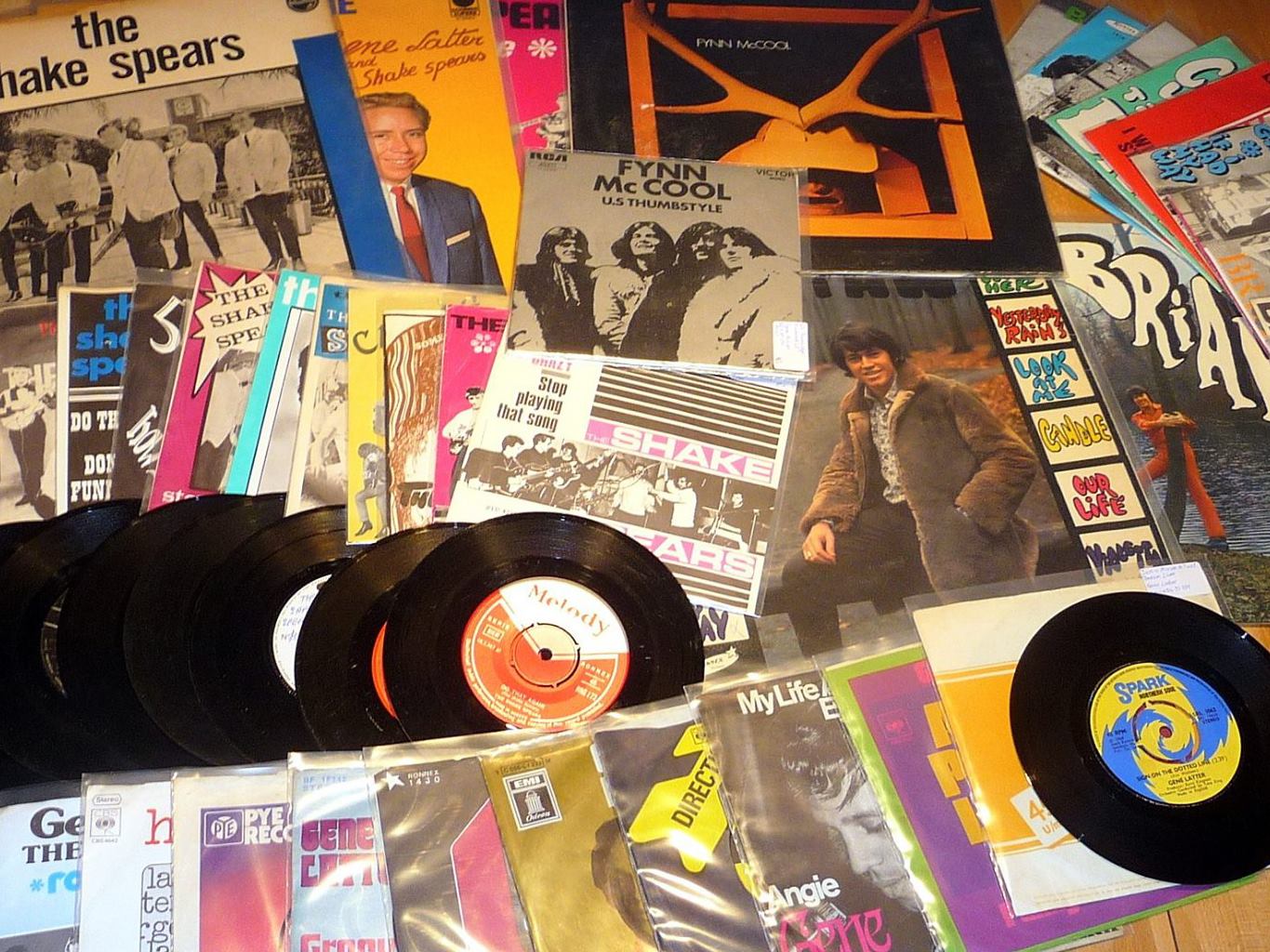
Gene Latter
1966 Mar 25 7″ Just A Minute Or Two / Dream Lover UK Decca F 12364
1966 May 13 7″ Mother’s Little Helper / Please Come Back To Me Again UK Decca F 12397
1966 Jun 7″ Dream Lover / Just A Minute Or Two Germany Decca DL 25 239
1966 Dec 7″ Something Inside Me Died / Don’t Go UK CBS 202483
1967 Mar 31 7″ Always / A Woman Called Sorrow promo UK CBS 202655
1967 Mar 31 7″ Always / A Woman Called Sorrow UK CBS 202655
1967 Jul 14 7″ A Little Piece Of Leather / Funny Face Girl promo UK CBS 2843
1967 Jul 14 7″ A Little Piece Of Leather / Funny Face Girl UK CBS 2843
1967 Aug 7″ A Little Piece Of Leather / Funny Face Girl Germany CBS 2843
1967 7″ A Little Piece Of Leather / Funny Face Girl Belgium CBS 2843
1967 7″ A Little Piece Of Leather / Funny Face Girl Netherlands CBS 2843
19?? 7″ A Little Piece Of Leather / Funny Face Girl UK CBS 8131
1967 Sep 7″ With A Child’s Heart / Ways promo UK CBS 2986
1968 Jan 7″ A Tribute To Otis / Bring Your Love Home UK Direction 58-3245
1968 Jul 12 7″ Angie / Young And Beautiful<i>(as Gene Darling)</i> UK Spark SRL 1011
1969 7″ Sign On The Dotted Line / I Love You UK Spark SRL 1022
1969 7″ Sign On The Dotted Line / I Love You Germany Spark 14 261 AT
1969 Jul 11 7″ Holding A Dream / The Old Iron Bell UK Spark SRL 1031
1969 Aug 22 7″ Help Me Judy, Help Me / On The Highway UK Parlophone R5800
1969 Sep 7″ On The Highway / Help Me Judy, Help Me Germany Odeon 1C 006-04 232 M
1969 Oct 3 7″ Help Me Judy, Help Me / On The Highway Netherlands Parlophone 5C 006.04232 M
1969 Oct 31 7″ Tiger Bay / We Can Make It Out UK Parlophone R5815
1970 Jul 7″ Someday You’ll Need My Love / Come On Home UK Parlophone R5853
1971 Apr 2 7″ Catch My Soul / Happiness UK Parlophone R5896
1971 7″ Catch My Soul / Happiness Belgium Ronnex 1430
1971 7″ Catch My Soul / Happiness Netherlands Parlophone 5C 006-04809
1971 Aug 7″ Sing A Song Of Freedom / Too Busy Thinking About My Baby UK Parlophone R5913
1972 Apr 7 7″ Sign On The Dotted Line / I Love You promo UK Spark SRL 1063
1972 7″ Sign On The Dotted Line / I Love You UK Spark SRL 1063
1972 7″ Sign On The Dotted Line / I Love You promo Italy Spark AC 026
1972 7″ Sign On The Dotted Line / I Love You Italy Spark SR 809 LG
1972 7″ Sign On The Dotted Line / I Love You Sweden Spark SP 5045
1972 7″ Rock ‘n Roll Is Here Again / Come on Home Belgium Ronnex 1437
1974 Jun 7 7″ All Over Now / Annie’s Place UK Youngblood YB 1069
1974 Dec 7″ Sweet Little Rock And Roller / Annie’s Place Italy Young Blood YB 1022
1974 7″ Sweet Little Rock And Roller / Annie’s Place Germany Young Blood DL 25 641
1974 7″ Sweet Little Rock And Roller / Auntie Annie’s Place France Carrere 49.068
1974 7″ Sweet Little Rock And Roller / Auntie Annie’s Place Spain Poplandia P-30577
1974 Nov 15 7″ Sweet Little Rock And Roller / Rock ‘n’ Roll ’74 promo UK Private Stock Records PVT 4
1974 7″ Sweet Little Rock And Roller / Rock ‘n’ Roll ’74 UK Private Stock Records PVT 4
1974 7″ Groove It / Annie’s Place France Polydor 2056 464
1974 7″ Groove It / Red Indians Don’t Cry Germany Bellafon BF 18342
1974 7″ Groove It / Red Indians Don’t Cry UK Private Stock PVT 20
1975 7″ Groove It / Red Indians Don’t Cry Netherlands Negram NG 653
1975 Mar 14 7″ Sign On The Dotted Line / I Love You UK Spark SRL 1063
1975 May 16 7″ Groove It / Red Indians Don’t Cry UK Private Stock Records PVT 20
1976 Feb 26 7″ American Girl / I Wanna Dance UK Pye 7N 45581
1976 7″ Hello Hello / Mississippi Lady Germany CBS 4642
1976 7″ Hello Hello / Mississippi Lady promo Germany CBS 4642
1977 7″ Hello Hello / Mississippi Lady promo Spain RCA Victor SPBO-7094
1978 7″ Boogie Woogie Baby / Geronimo Belgium Ronnex 1454
1978 7″ Boogie Woogie Baby / Geronimo Belgium Ronnex R 1454
1978 7″ Rock Your Boat / Funk and Hustle Belgium Ronnex 1452
1978 7″ Rock Your Boat / Funk and Hustle Netherlands Groovy GRS 15093
1978 7″ John Travolta, You are a Superstar / Touch Me! ? Gip 468
1979 7″ John Travolta, You are a Superstar / Touch Me! Italy Durium DE. 3046
1979 7″ Rock Your Boat / Submarine Rock Canada Coach House Records GUY 20
1979 7″ Rock Baby Rock / Only You Belgium Ronnex 1458
1982 Jul 7″ Rock Baby Rock / Sweet Sugar Ray ? MAG 230
1984 7″ You’re So Sympatico / Melancholy B Baby Belgium Ronnex 1501
19?? 7″ Hello Hello / Funk ‘n Hustle Belgium Sinus Music BE 120-3144
Gene Latter & The Detours
1967 7″ Run to Me Baby / Hanging on UK CBS 3213
1968 Jul 26 7″ My Life Ain’t Easy / Angie UK Spark Srl 1015
1968 Nov 7″ My Life Ain’t Easy / Angie Germany Spark 14 166 AT
1968 Apr 11 7″ Whole Lot of Lovin’ / Pieces of You UK CBS

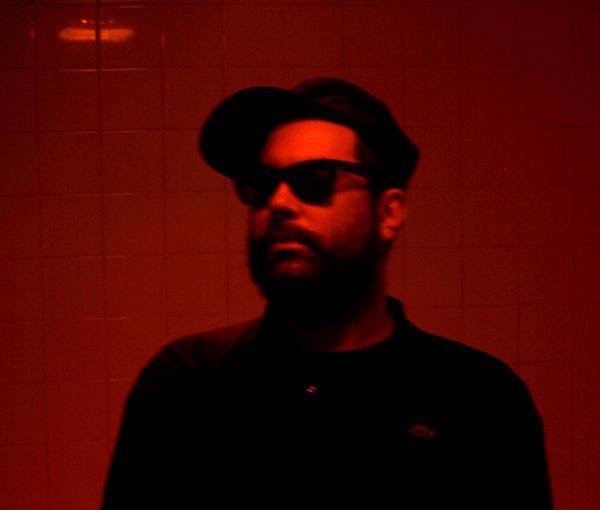
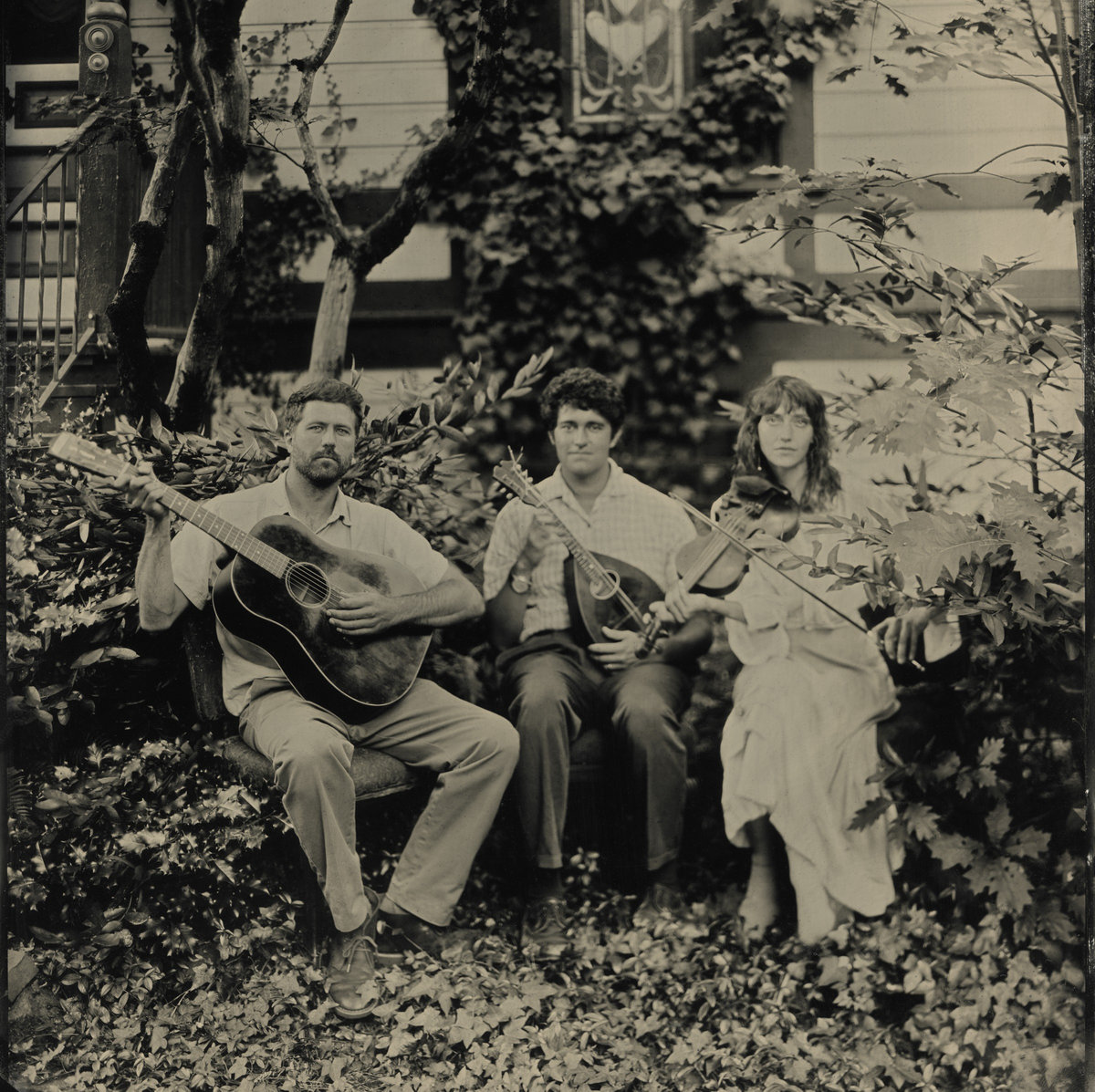
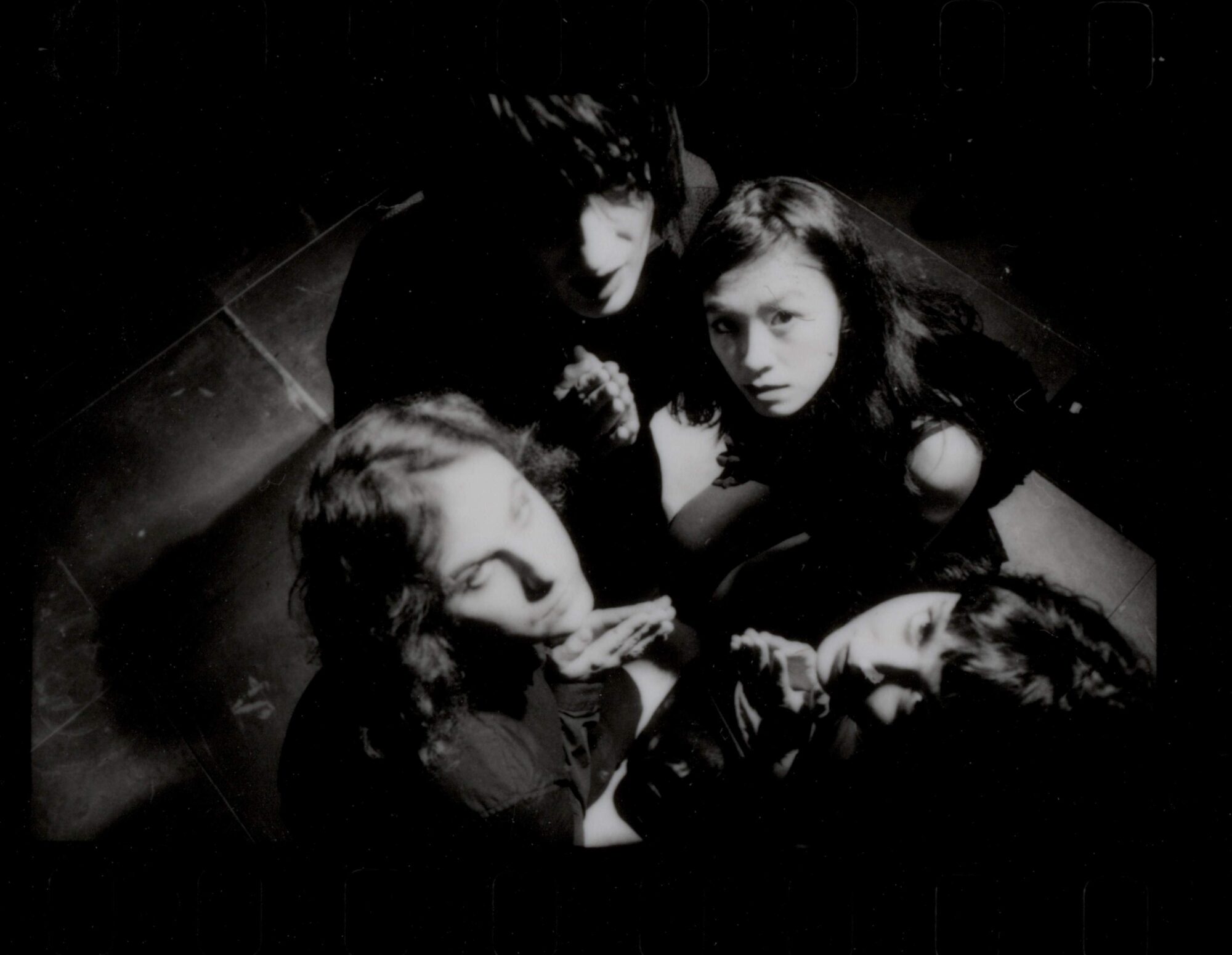
WOW…. how super cool to have come accross you page. Johnny Kreuger now lives in Sedgefield and is playing in a band called Cloud 9. They’re kept very busy with Gigs here on the Garden Route in South Africa. They playing for free for us (Sedgefield Animal Matters – SAM) an animal welfare charity in Sedgefield and they are fantastic.
Stunning to read and discover this page. Chris Kritzinger …family .. to young to know or to have met him.
My fathers brothers son. So close.
He must be in his early 80’s. Does anybody know if he is still alive?